数学专业英语(1)
数学专业英语
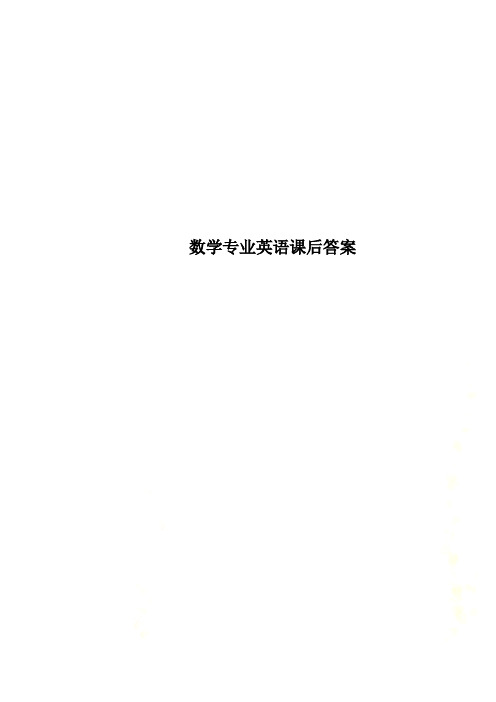
数学专业英语课后答案2.1数学、方程与比例词组翻译1.数学分支branches of mathematics,算数arithmetics,几何学geometry,代数学algebra,三角学trigonometry,高等数学higher mathematics,初等数学elementary mathematics,高等代数higher algebra,数学分析mathematical analysis,函数论function theory,微分方程differential equation2.命题proposition,公理axiom,公设postulate,定义definition,定理theorem,引理lemma,推论deduction3.形form,数number,数字numeral,数值numerical value,图形figure,公式formula,符号notation(symbol),记法/记号sign,图表chart4.概念conception,相等equality,成立/真true,不成立/不真untrue,等式equation,恒等式identity,条件等式equation of condition,项/术语term,集set,函数function,常数constant,方程equation,线性方程linear equation,二次方程quadratic equation5.运算operation,加法addition,减法subtraction,乘法multiplication,除法division,证明proof,推理deduction,逻辑推理logical deduction6.测量土地to measure land,推导定理to deduce theorems,指定的运算indicated operation,获得结论to obtain the conclusions,占据中心地位to occupy the centric place汉译英(1)数学来源于人类的社会实践,包括工农业的劳动,商业、军事和科学技术研究等活动。
数学专业英语词汇英汉对照
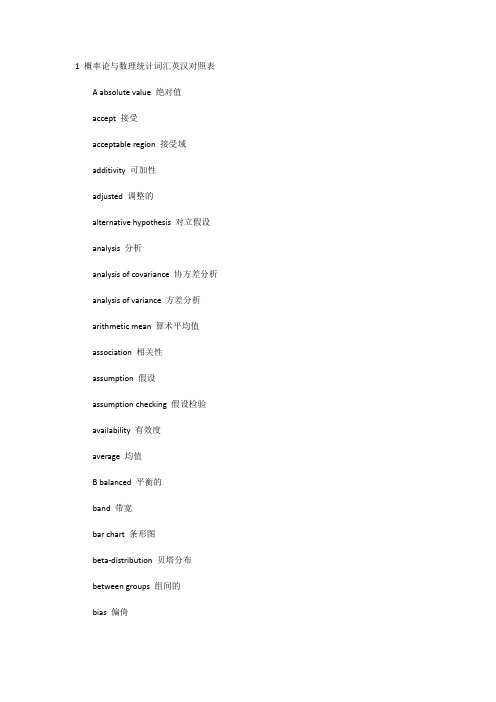
1 概率论与数理统计词汇英汉对照表A absolute value 绝对值accept 接受acceptable region 接受域additivity 可加性adjusted 调整的alternative hypothesis 对立假设analysis 分析analysis of covariance 协方差分析analysis of variance 方差分析arithmetic mean 算术平均值association 相关性assumption 假设assumption checking 假设检验availability 有效度average 均值B balanced 平衡的band 带宽bar chart 条形图beta-distribution 贝塔分布between groups 组间的bias 偏倚binomial distribution 二项分布binomial test 二项检验C calculate 计算case 个案category 类别center of gravity 重心central tendency 中心趋势chi-square distribution 卡方分布chi-square test 卡方检验classify 分类cluster analysis 聚类分析coefficient 系数coefficient of correlation 相关系数collinearity 共线性column 列compare 比较comparison 对照components 构成,分量compound 复合的confidence interval 置信区间consistency 一致性constant 常数continuous variable 连续变量control charts 控制图correlation 相关covariance 协方差covariance matrix 协方差矩阵critical point 临界点critical value 临界值crosstab 列联表cubic 三次的,立方的cubic term 三次项cumulative distribution function 累加分布函数curve estimation 曲线估计D data 数据default 默认的definition 定义deleted residual 剔除残差density function 密度函数dependent variable 因变量description 描述design of experiment 试验设计deviations 差异df.(degree of freedom)自由度diagnostic 诊断dimension 维discrete variable 离散变量discriminant function 判别函数discriminatory analysis 判别分析distance 距离distribution 分布D-optimal design D-优化设计E eaqual 相等effects of interaction 交互效应efficiency 有效性eigenvalue 特征值equal size 等含量equation 方程error 误差estimate 估计estimation of parameters 参数估计estimations 估计量evaluate 衡量exact value 精确值expectation 期望expected value 期望值exponential 指数的exponential distributon 指数分布extreme value 极值F factor 因素,因子factor analysis 因子分析factor score 因子得分factorial designs 析因设计factorial experiment 析因试验fit 拟合fitted line 拟合线fitted value 拟合值fixed model 固定模型fixed variable 固定变量fractional factorial design 部分析因设计frequency 频数F-test F检验full factorial design 完全析因设计function 函数G gamma distribution 伽玛分布geometric mean 几何均值group 组H harmomic mean 调和均值heterogeneity 不齐性histogram 直方图homogeneity 齐性homogeneity of variance 方差齐性hypothesis 假设hypothesis test 假设检验I independence 独立independent variable 自变量independent-samples 独立样本index 指数index of correlation 相关指数interaction 交互作用interclass correlation 组内相关interval estimate 区间估计intraclass correlation 组间相关inverse 倒数的iterate 迭代K kernal 核Kolmogorov-Smirnov test柯尔莫哥洛夫-斯米诺夫检验kurtosis 峰度L large sample problem 大样本问题layer 层least-significant difference 最小显著差数least-square estimation 最小二乘估计least-square method 最小二乘法level 水平level of significance 显著性水平leverage value 中心化杠杆值life 寿命life test 寿命试验likelihood function 似然函数likelihood ratio test 似然比检验linear 线性的linear estimator 线性估计linear model 线性模型linear regression 线性回归linear relation 线性关系linear term 线性项logarithmic 对数的logarithms 对数logistic 逻辑的lost function 损失函数M main effect 主效应matrix 矩阵maximum 最大值maximum likelihood estimation 极大似然估计mean squared deviation(MSD)均方差mean sum of square 均方和measure 衡量media 中位数M-estimator M估计minimum 最小值missing values 缺失值mixed model 混合模型mode 众数model 模型Monte Carle method 蒙特卡罗法moving average 移动平均值multicollinearity 多元共线性multiple comparison 多重比较multiple correlation 多重相关multiple correlation coefficient 复相关系数multiple correlation coefficient 多元相关系数multiple regression analysis 多元回归分析multiple regression equation 多元回归方程multiple response 多响应multivariate analysis 多元分析N negative relationship 负相关nonadditively 不可加性nonlinear 非线性nonlinear regression 非线性回归noparametric tests 非参数检验normal distribution 正态分布null hypothesis 零假设number of cases 个案数O one-sample 单样本one-tailed test 单侧检验one-way ANOVA 单向方差分析one-way classification 单向分类optimal 优化的optimum allocation 最优配制order 排序order statistics 次序统计量origin 原点orthogonal 正交的outliers 异常值P paired observations 成对观测数据paired-sample 成对样本parameter 参数parameter estimation 参数估计partial correlation 偏相关partial correlation coefficient 偏相关系数partial regression coefficient 偏回归系数percent 百分数percentiles 百分位数pie chart 饼图point estimate 点估计poisson distribution 泊松分布polynomial curve 多项式曲线polynomial regression 多项式回归polynomials 多项式positive relationship 正相关power 幂P-P plot P-P概率图predict 预测predicted value 预测值prediction intervals 预测区间principal component analysis 主成分分析proability 概率probability density function 概率密度函数probit analysis 概率分析proportion 比例Q qadratic 二次的Q-Q plot Q-Q概率图quadratic term 二次项quality control 质量控制quantitative 数量的,度量的quartiles 四分位数R random 随机的random number 随机数random number 随机数random sampling 随机取样random seed 随机数种子random variable 随机变量randomization 随机化range 极差rank 秩rank correlation 秩相关rank statistic 秩统计量regression analysis 回归分析regression coefficient 回归系数regression line 回归线reject 拒绝rejection region 拒绝域relationship 关系reliability 可靠性repeated 重复的report 报告,报表residual 残差residual sum of squares 剩余平方和response 响应risk function 风险函数robustness 稳健性root mean square 标准差row 行run 游程run test 游程检验S sample 样本sample size 样本容量sample space 样本空间sampling 取样sampling inspection 抽样检验scatter chart 散点图S-curve S形曲线separately 单独地sets 集合sign test 符号检验significance 显著性significance level 显著性水平significance testing 显著性检验significant 显著的,有效的significant digits 有效数字skewed distribution 偏态分布skewness 偏度small sample problem 小样本问题smooth 平滑sort 排序soruces of variation 方差来源space 空间spread 扩展square 平方standard deviation 标准离差standard error of mean 均值的标准误差standardization 标准化standardize 标准化statistic 统计量statistical quality control 统计质量控制std. residual 标准残差stepwise regression analysis 逐步回归stimulus 刺激strong assumption 强假设stud. deleted residual 学生化剔除残差stud. residual 学生化残差subsamples 次级样本sufficient statistic 充分统计量sum 和sum of squares 平方和summary 概括,综述T table 表t-distribution t分布test 检验test criterion 检验判据test for linearity 线性检验test of goodness of fit 拟合优度检验test of homogeneity 齐性检验test of independence 独立性检验test rules 检验法则test statistics 检验统计量testing function 检验函数time series 时间序列tolerance limits 容许限total 总共,和transformation 转换treatment 处理trimmed mean 截尾均值true value 真值t-test t检验two-tailed test 双侧检验U unbalanced 不平衡的unbiased estimation 无偏估计unbiasedness 无偏性uniform distribution 均匀分布V value of estimator 估计值variable 变量variance 方差variance components 方差分量variance ratio 方差比various 不同的vector 向量W weight 加权,权重weighted average 加权平均值within groups 组内的Z Z score Z分数2. 最优化方法词汇英汉对照表A active constraint 活动约束active set method 活动集法analytic gradient 解析梯度approximate 近似arbitrary 强制性的argument 变量attainment factor 达到因子B bandwidth 带宽be equivalent to 等价于best-fit 最佳拟合bound 边界C coefficient 系数complex-value 复数值component 分量constant 常数constrained 有约束的constraint 约束constraint function 约束函数continuous 连续的converge 收敛cubic polynomial interpolation method 三次多项式插值法curve-fitting 曲线拟合D data-fitting 数据拟合default 默认的,默认的define 定义diagonal 对角的direct search method 直接搜索法direction of search 搜索方向discontinuous 不连续E eigenvalue 特征值empty matrix 空矩阵equality 等式exceeded 溢出的F feasible 可行的feasible solution 可行解finite-difference 有限差分first-order 一阶G Gauss-Newton method 高斯-牛顿法goal attainment problem 目标达到问题gradient 梯度gradient method 梯度法Hhandle 句柄Hessian matrix 海色矩阵I independent variables 独立变量inequality 不等式infeasibility 不可行性infeasible 不可行的initial feasible solution 初始可行解initialize 初始化inverse 逆invoke 激活iteration 迭代iteration 迭代J Jacobian 雅可比矩阵L Lagrange multiplier 拉格朗日乘子large-scale 大型的least square 最小二乘least squares sense 最小二乘意义上的Levenberg-Marquardt method列文伯格-马夸尔特法line search 一维搜索linear 线性的linear equality constraints 线性等式约束linear programming problem 线性规划问题local solution 局部解M medium-scale 中型的minimize 最小化mixed quadratic and cubic polynomial interpolation and extrapolation method 混合二次、三次多项式内插、外插法multiobjective 多目标的N nonlinear 非线性的norm 范数O objective function 目标函数observed data 测量数据optimization routine 优化过程optimize 优化optimizer 求解器over-determined system 超定系统P parameter 参数partial derivatives 偏导数polynomial interpolation method多项式插值法Q quadratic 二次的quadratic interpolation method 二次内插法quadratic programming 二次规划R real-value 实数值residuals 残差robust 稳健的robustness 稳健性,鲁棒性S scalar 标量semi-infinitely problem 半无限问题Sequential Quadratic Programming method序列二次规划法simplex search method 单纯形法solution 解sparse matrix 稀疏矩阵sparsity pattern 稀疏模式sparsity structure 稀疏结构starting point 初始点step length 步长subspace trust region method 子空间置信域法sum-of-squares 平方和symmetric matrix 对称矩阵T termination message 终止信息termination tolerance 终止容限the exit condition 退出条件the method of steepest descent 最速下降法transpose 转置U unconstrained 无约束的under-determined system 负定系统V variable 变量vector 矢量W weighting matrix 加权矩阵3 样条词汇英汉对照表A approximation 逼近array 数组a spline in b-form/b-spline b样条a spline of polynomial piece /ppform spline 分段多项式样条B bivariate spline function 二元样条函数break/breaks 断点C coefficient/coefficients 系数cubic interpolation 三次插值/三次内插cubic polynomial 三次多项式cubic smoothing spline 三次平滑样条cubic spline 三次样条cubic spline interpolation三次样条插值/三次样条内插curve 曲线D degree of freedom 自由度dimension 维数E end conditions 约束条件I input argument 输入参数interpolation 插值/内插interval 取值区间K knot/knots 节点L least-squares approximation 最小二乘拟合M multiplicity 重次multivariate function 多元函数O optional argument 可选参数order 阶次output argument 输出参数P point/points 数据点R rational spline 有理样条rounding error 舍入误差(相对误差)S scalar 标量sequence 数列(数组)spline 样条spline approximation 样条逼近/样条拟合spline function 样条函数spline curve 样条曲线spline interpolation 样条插值/样条内插spline surface 样条曲面smoothing spline 平滑样条T tolerance 允许精度U univariate function 一元函数V vector 向量W weight/weights 权重4 偏微分方程数值解词汇英汉对照表A absolute error 绝对误差absolute tolerance 绝对容限adaptive mesh 适应性网格B boundary condition 边界条件C contour plot 等值线图converge 收敛coordinate 坐标系D decomposed 分解的decomposed geometry matrix 分解几何矩阵diagonal matrix 对角矩阵Dirichlet boundary conditionsDirichlet边界条件E eigenvalue 特征值elliptic 椭圆形的error estimate 误差估计exact solution 精确解G generalized Neumann boundary condition 推广的Neumann边界条件geometry 几何形状geometry description matrix 几何描述矩阵geometry matrix 几何矩阵graphical user interface(GUI)图形用户界面H hyperbolic 双曲线的I initial mesh 初始网格J jiggle 微调L Lagrange multipliers 拉格朗日乘子Laplace equation 拉普拉斯方程linear interpolation 线性插值loop 循环M machine precision 机器精度mixed boundary condition 混合边界条件N Neuman boundary condition Neuman边界条件node point 节点nonlinear solver 非线性求解器normal vector 法向量P Parabolic 抛物线型的partial differential equation 偏微分方程plane strain 平面应变plane stress 平面应力Poisson's equation 泊松方程polygon 多边形positive definite 正定Q quality 质量R refined triangular mesh 加密的三角形网格relative tolerance 相对容限relative tolerance 相对容限residual 残差residual norm 残差范数S singular 奇异的。
数学专业英语
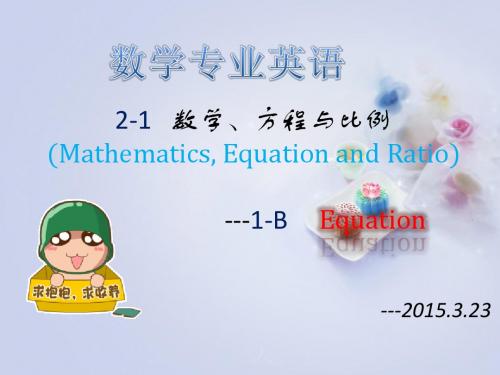
vt.表明,标示,指示; 象征,暗示,预 示; [医]显示需要做…的治疗;
numerical[英][nju:ˈmerɪkl][美][nu:ˈmerɪkl]
adj.数字的,用数字表示的,数值的;
root[英][ru:t][美][rut, rʊt]
n.根,根源; 原因,本质; 祖先; [乐]和弦基音; vt.使生根; 使固定; 根源在于; 欢呼,喝彩; vi.生根; 根除;
n.身份; [逻]同一性; 个性; [数]恒等(式);
arithmetic[英][əˈrɪθmətɪk][美][əˈrɪθmɪtɪk]
n.算术,计算; 算法;
algebraic[英][ˌældʒɪ'breɪɪk][美][ˌældʒəˈbreɪk]
adj.代数的,关于代数学的;
indicate[英][ˈɪndɪkeɪt][美][ˈɪndɪˌket]
你拿这个或那个都可以。
1. either…or…连接两个成分作主语时,谓语动 词通常与其靠近的主语保持一致。如: Either you or I am to go. 你或我必须有人去。 但在非正式文体中,有时也会一律用复数谓 语。如:If either David or Janet come, they will want a drink.
prep.在...的附近; 在...的周围
解方程意味着求未知项的值,为了求未知项的值,当 然,我们必须移项,直到未知项单独在方程的一边, 令其等于方程的另一边,求得未知项的值,这样我们 就解决了问题。
on one side…on the other side…一方面……另一方面……
脑筋急转弯:
Two little brother,One lives on one side,The other on the other side,They hear what you say But they do not see each other,Who are they?
数学专业英语1

数学专业英语1学专业英语-How to Write Mathematics?How to Write Mathematics?------ Honesty is the Best PolicyThe purpose of using good mathematical language is, of course, to make the u nderstanding of the subject easy for the reader, and perhaps even pleasant. The style should be good not in the sense of flashy brilliance, but good in the se nse of perfect unobtrusiveness. The purpose is to smooth the reader’s wanted, not pedantry; understanding, not fuss.The emphasis in the preceding paragraph, while perhaps necessary, might see m to point in an undesirable direction, and I hasten to correct a possible misin terpretation. While avoiding pedantry and fuss, I do not want to avoid rigor an d precision; I believe that these aims are reconcilable. I do not mean to advise a young author to be very so slightly but very very cleverly dishonest and to gloss over difficulties. Sometimes, for instance, there may be no better way t o get a result than a cumbersome computation. In that case it is the author’s duty to carry it out, in public; the he can do to alleviate it is to extend his s ympathy to the reader by some phrase such as “unfortunately the only known proof is the following cumbersome comp utation.”Here is the sort of the thing I mean by less than complete honesty. At a certa in point, having proudly proved a proposition P, you feel moved to say: “Not e, however, that p does not imply q”, and then, thinking that you’ve done a good expositor y job, go happily on to other things. Your motives may be per fectly pure, but the reader may feel cheated just the same. If he knew all abo ut the subject, he wouldn’t be reading you; for him thenonimplication is, qui te likely, unsupported. Is it obvious? (Say so.) Will a counterexample be suppl ied later? (Promise it now.) Is it a standard present purposes irrelevant part of the literature? (Give a reference.) Or, horrible dictum, do you merely mean th at you have tried to derive q from p, you failed, a nd you don’t in fact know whether p implies q? (Confess immediately.) any event: take the reader into y our confidence.There is nothing wrong with often derided “obvious”and “easy to see”, b ut there are certain minimal rules to their use. Surely when you wrote that so mething was obvious, you thought it was. When, a month, or two months, or six months later, you picked up the manuscript and re-read it, did you still thi nk that something was obvious? (A few months’ripening always improves ma nuscripts.) When you explained it to a friend, or to a seminar, was the someth ing at issue accepted as obvious? (Or did someone question it and subside, mu ttering, when you reassured him? Did your assurance demonstration or intimida tion?) the obvious answers to these rhetorical questions are among the rules th at should control the use of “obvious”. There is the most frequent source o f mathematical error: make that the “obvious”is true.It should go without saying that you are not setting out to hide facts from the reader: you are writing to uncover them. What I am saying now is that you should not hide the status of your statements and your attitude toward them eit her. Whenever you tell him something, tell him where it stands: this has been proved, that hasn’t, this will be proved, that won’t. Emphasize the importan t and minimize the trivial. The reason saying that they are obvious is to put t hem in proper perspecti e for the uninitiated. Even if your saying so makes an occasional readerangry at you, a good purpose is served by your telling him how you view the matter. But, of course, you must obey the rules. Don’t le t the reader down; he wants to believe in you. Pretentiousness, bluff, and conc ealment may not get caught out immediately, but most readers will soon sense that there is something wrong, and they will blame neither the facts nor them selves, but quite properly, the author. Complete honesty makes for greatest clar ity.---------Paul R.Haqlmosvocabularyflashy 一闪的 counter-example 反例unobtrusiveness 谦虚dictum 断言;格言forestall 阻止,先下手deride嘲弄anticipate 预见 subside沉静pedantry 迂腐;卖弄学问 mutter出怨言,喃喃自语fuss 小题大做 intimidation威下reconcilable 使一致的 rhetorical合符修辞学的gloss 掩饰 pretentiousness自命不凡alleviate 减轻,缓和bluff 欺骗implication 包含,含意concealment隐匿notes1. 本课文选自美国数学学会出版的小册子How to write mathematics 中Paul R.Halmos. 的文章第9节2. The purpose is smooth the reader’way, to anticipates his difficulties and to forestall them. Clarit y is what’s wanted, not pedantry; understanding, not fuss.意思是:目的是为读者扫清阅读上的障碍,即预先设想读者会遇到什么困难,并力求避免出现这类困难。
数学专业英语第一章

特点二:科学内容的完整性与表达形式的精 炼性要求
1、长句较多 2、非限定动词使用频率高
Eg1: By introducing a new smoothing function, the problem is approximated by a family of parameterized optimization problems with twice continuously differentiable objective functions.
3、能用英语书写文章摘要、学术会议通知、 学术交流信件等。同时培养简单的英语会 话能力。 4、为部分优秀学生攻读研究生奠定数学专 业英语的基础,同时让大部分同学了解数 学专业英语与生活英语的区别,为今后走 上工作岗位,特别是服务于IT业或外资企 业有独当一面的能力。
本课程分四部分讲解:
精选课文:1、理解数学专业文章和一般英语文章写作的不同;
对于学习数学的学生和准备从事数学研究的人员在掌握了公共英语的基本知识的基础上如果希望较快地掌握阅读英文版数学教程和科研资料的基本方法进一步学习数学专业英语是必须的
数学专业英语 第一讲
为什么要学习数学专业英语?
❖ 数学学科发展需要:20世纪90年代计算机科学技术 的迅速发展宣告了人类信息时代的到来。数学,这 个古老而又优雅的学科获得了新的发展动力和发挥 作用的舞台。
Eg2: A right angle is a 90 angle. 见P31
2. 被动语态出现频率高,应用范围广
Eg1:The Fermat Conjecture has been proved to be true.
Eg2: The function idea may be illustrated schematically in many ways. 见P54
1-1 数学专业英语的基本特点

译文: 因为 h(x) 在某个邻域 B(a, r) 内调和 , 故 h( x ) d ( x ) h( a ) 。
B
这里“we have”并不强调“我们有”什么,而是说明“可以得出” 什么结论,可以换为“one has”或者省略而不影响原意。
特点二:科学内容的完整性与表达形式的精练性要求 • 数学结论的成立都是有条件的,推导都有充分根
完成时。
7
如:
Definition. Let y = f(x) be a function and suppose that a is in the domain of f. A line L containing (a, f(a)) is a tangent line to f at x = a if the slope of L is the limit
well as the domain over which the integration is performed has been generalized. 19世纪初,出现了一些更复杂的积分概念,这些概念是通过推
广被积函数和积分区域而得到。
15
In general, the integrand may be a function of more than one
19
例:Now we investigate whether the functions are integrable and why they are integrable or not. 现在,我们来研究这些函数是否可积及它们可积或不可积的原因 改:Now we investigate the integrability of the function. 名词化结构integrability of the functions代替了whether和why 引起的从句,不仅使句子简洁,而且显得专业性更强。 例: Television is the transmission and reception of images of moving objects by radio waves. 电视通过无线电波发射和接受活动物体的图象。 the transmission and reception of images of moving objects by radio waves 名词化结构
数学专业英语(Doc版).15
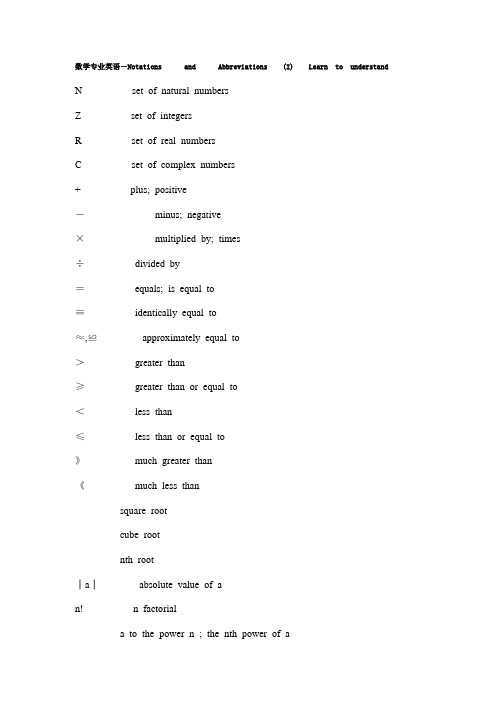
数学专业英语-Notations and Abbreviations (I) Learn to understand N set of natural numbersZ set of integersR set of real numbersC set of complex numbers+ plus; positive-minus; negative×multiplied by; times÷divided by=equals; is equal to≡identically equal to≈,≌approximately equal to>greater than≥greater than or equal to<less than≤less than or equal to》much greater than《much less thansquare rootcube rootnth root│a│ absolute value of an! n factoriala to the power n ; the nth power of a[a] the greatest integer≤athe reciprocal of aLet A, B be sets∈ belongs to ; be a member ofnot belongs tox∈A x os amember of A∪ unionA∪B A union B∩ intersectionA∩B A intersection BA B A is a subset of B;A is contained in B A B A contains Bcomplement of Athe closure of Aempty set( ) i=1,2,…,r j=1,2,…,s r-by-s(r×s)matrix││I,j=1,2,…,n determinant of order ndet( ) the determinant of the matrix ( )vector Fx=( , ,…, ) x is an n-tuple of‖‖the norm of …‖ parallel to┴ perpendicular tothe exponential function of xlin x the logarithmic function of xsie sinecos cosinetan tangentsinh hyperbolic sinecosh hyperbolic cosinethe inverse of ff is the composite or the composition of u and vthe limit of …as n approaches ∞(as x approaches )x a x approaches a, the differential coefficient of y; the 1st derivative of y , the nth derivative of ythe partial derivative of f with respect to xthe partial derivative of f with respect to ythe indefinite integral of fthe definite integral of f between a and b (from a to b) the increment of xdifferential xsummation of …the sum of the terms indicated∏the product of the terms indicated=> impliesis equivalent to()round brackets; parantheses[ ] square brackets{ } braces。
数学专业英语词汇(L)
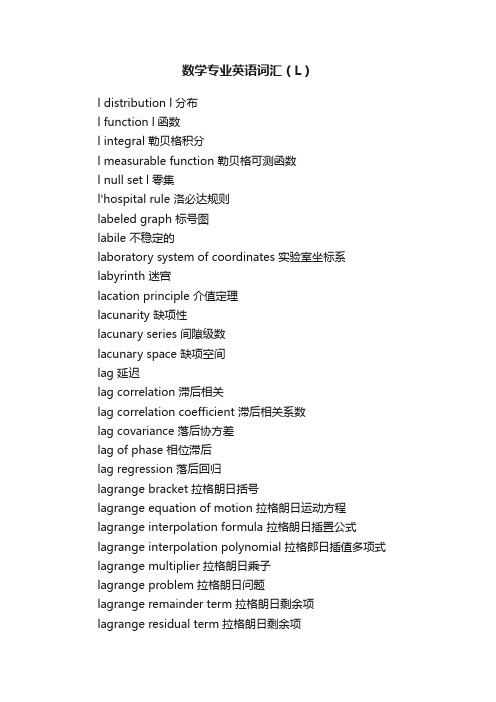
数学专业英语词汇(L)l distribution l分布l function l函数l integral 勒贝格积分l measurable function 勒贝格可测函数l null set l零集l'hospital rule 洛必达规则labeled graph 标号图labile 不稳定的laboratory system of coordinates 实验室坐标系labyrinth 迷宫lacation principle 介值定理lacunarity 缺项性lacunary series 间隙级数lacunary space 缺项空间lag 延迟lag correlation 滞后相关lag correlation coefficient 滞后相关系数lag covariance 落后协方差lag of phase 相位滞后lag regression 落后回归lagrange bracket 拉格朗日括号lagrange equation of motion 拉格朗日运动方程lagrange interpolation formula 拉格朗日插置公式lagrange interpolation polynomial 拉格郎日插值多项式lagrange multiplier 拉格朗日乘子lagrange problem 拉格朗日问题lagrange remainder term 拉格朗日剩余项lagrange residual term 拉格朗日剩余项lagrange theorem 拉格朗日定理lagrangian 拉格朗日算子thermocouple pyrometer 热电偶高温计lagrangian function 拉格朗日算子lagrangian operator 拉格朗日算符laguerre differential equation 拉盖尔微分方程laguerre function 拉盖尔函数laguerre polynomial 拉盖尔多项式lambert series 兰伯特级数lame equation 拉梅方程lame function 拉梅函数laminar 薄层的laminar flow 层流片流landau symbol 兰道记号landen transformation 兰登变换language of formula 公式语言laplace beltrami operator 拉普拉斯贝尔特拉米算子laplace distribution 拉普拉斯分布laplace equation 拉普拉斯方程laplace expansion 拉普拉斯展开laplace expansion theorem 拉普拉斯展开定理laplace integral 拉普拉斯积分laplace linear equation 拉普拉斯线性方程laplace transform 拉普拉斯变换laplacian 拉普拉斯算子laplacian equation 拉普拉斯方程large sample analysis 大样本分析large sample test 大样本检验last multiplier 最后乘子last term 末项latency 潜在latent 潜在的lateral 横的lateral area 侧面积lateral surface 侧面latin cube 拉丁立方latin rectangle 拉丁矩形latin square 拉丁方latitude 纬度lattice 格子;格lattice constant 点阵常数lattice design 格子设计lattice distribution 格分布lattice function 点阵函数lattice isomorphism 格同构lattice matrix 点阵矩阵lattice of sets 集格lattice operation 格运算lattice ordered group 格序群lattice point at the boundary 边界格点lattice theoretic 格论的lattice theory 格论latticehomomorphism 格同态latus rectum 通径laue's equations 劳卮方程laurent series 罗郎级数law 法则law of commutation 交换律law of composition 合成律law of cosines 余弦定律law of deduction 演绎定律law of double negation 双重否定律law of errors 误差律law of excluded middle 排中律law of exponentiation 指数定律law of inertia 惯性律law of iterated logarithm 迭对数定律law of large numbers 大数定律law of similarity transformation 相似变换律law of sines 正弦定律law of small numbers 小数定律law of tangents 正切定律laws of integral exponents 整指数定律leading coefficient 首项系数leading diagonal 衷角线leading ideal 猪想leading term 知项leaf 叶least common denominator 最小公分母least common left multiple 左最小公倍数least common multiple 最小公倍数least common right multiple 右最小公倍数least significant digit 最小有效数字least squares approximation 最小二乘逼近least squares estimator 最小二乘估计量least upper bound 最小上界lebesgue area 勒贝格面积lebesgue decomposition 勒贝格分解lebesgue integrable 勒贝格可积的lebesgue integral 勒贝格积分lebesgue measurable 勒贝格可测的lebesgue measure 勒贝格测度lebesgue number 勒贝格数lebesgue space 勒贝格空间lebesgue stieltjes integral 勒贝格斯蒂尔吉斯积分left adjoint 左伴随的left adjoint homomorphism 左伴随同态left almost periodic function 左殆周期函数left alternative division ring 左交错可除环left alternative law 左交错律left alternative ring 左交错环left annihilator 左零化子left artinian ring 左阿廷环left associated element 左相伴元素left balanced functor 左平衡函子left closed object 在闭对象left completion 左完备化left continuous 左方连续的left continuous function 左连续函数left coset 左陪集left coset space 左傍系空间left derivative 左导数left derived functor 左导函子left differential 左微分left direct product 左直积left directed quasiorder 逆有向拟序left distributive 左分配的left distributive law 左分配律left divisor 左因子left end point 左端点left exact functor 左正合函子left exactness 左正合性left faithful functor 左一一的函子left hand differentiable function 左可微函数left hand lower dini derivative 左下狄尼导数left hand side 左边left hand symmetrizable kernel 左方可对称化核left hand upper dini derivative 左上狄尼导数left handed co ordinate system 左手坐标系left handed curve 左旋曲线left handed system 左手坐标系left hereditary ring 左遗传环left homotopy inverse 左同伦逆元left ideal 左理想left identity element 左幺元left injective dimension 左内射维数left inner product 左内积left invariant mean 左不变平均值left invariant measure 左不变测度left inverse 左逆的left inverse element 左逆元left inverse matrix 左逆阵left inverse operator 左逆算子left invertible element 左可逆元left invertible mapping 左可逆映射left isolated point 左孤立点left kernel 左核left length 左长left limit value 左极限值left linear topology 左线性拓扑left localization 左局部化left mean 左平均left module 左模left monotonicity 左单翟left multiplication ring 左乘环left noetherian semigroup 左诺特半群left non zerodivisor 左非零因子left operator 左算子left order 左整环left periodic group 左周期群left primitive ideal 左本原理想left primitive ring 左本原环left projective space 左射影空间left quasi inverse 左拟逆元left quasi regularity 左拟正则性left quasi simple ring 左拟单环left quasigroup 左拟群left quotient 左商left quotient field 左商域left quotient ring 左商环left radical 左根基left regular element 左正则元素left regular representation 左正则表示left regularity 左正则性left remainder 左剩余left representation 左表示left resolution 左分解left satellite 左卫星函子left semihereditary ring 左半遗传环left semilinear mapping 左半线性映射left side contiuous function 左连续函数left side derivative 左导数left side half open interval 左半开区间left side limit value 左极限值left sided decomposition 左分解left simple groupoid 左单广群left simple semigroup 左单半群left tensor product 左张量乘积left topology 左拓扑left translation 左平移left zero divisor 左零因子leg of a right triangle 直角三角形的侧边legendre function 勒让德函数legendre polynomial 勒让德多项式legendre relation 勒让德关系legendre symbol 勒让德记号legendre transform 勒让德变换leibniz series 莱布尼兹级数leibniz theorem 莱布尼兹定理lemma 引理lemniscate 双纽线lemniscate function 双纽线函数lemniscate of bernoulli 伯努利双纽线length 长度length of arc 弧长length of curve 曲线的长length of normal 法线的长length of queue 队列长度length of tangent 切线的长length of vector 向量的长length unit 长度单位lens 透镜lens space 透镜空间leptokurtic distribution 尖峰态分布less than or equal 小于或等于letter 文字level 水准level curve 阶层曲线level line 等高线level plane 水准面level surface 等位面lever 杠杆levi decomposition 列维分解levi problem 列维问题lexicographic 词典的lexicographic order 字典顺序liapunov function 李雅普诺夫函数library 厍library subroutine 库存子程序lie algebra 李代数lie continuous group 李连续群lie derivative 李导数lie group 李群lie homomorphism 李同态lie ring 李环lie series 李级数lie subring 李子环life insurance 寿命保险life table 死亡率表life time 生存时间lifting 提升lifting map 提升映射lifting theorem 提升定理like term 同类项likelihood 似然likelihood function 似然函数likelihood ratio 似然比likelihood ratio test 似然比值检验limacon of pascal 帕斯卡蚶线limes inferior 下极限limes superior 上极限limit 极限limit case 极限情况limit circle 极限圆limit circle type 极限圆型limit cycle 极限环limit distribution 极限分布limit element 极限元limit function 极限函数limit in the sense of pointwise convergence 点态收敛极限limit of efficiency 有效极限limit of error 误差限度limit of integration 积分极限limit of proportionality 比例极限limit on the left 左极限limit on the right 右极限limit ordinal number 极限序数limit point 极限点limit point type 极限点型limit relation 极限关系limit theorem 极限定理limit theorem in probability theory 概率论极限定理limit value 极限值limitation 限制limited 有界的limited function 有界函数limiting cone 极限锥limiting distribution 极限分布limiting point 极限点limiting position 极限位置limitless 无界的limits of integration 积分限line 线line at infinity 无穷远线line bundle 线丛line coordinates 线坐标line critical graph 线临界图line element 线素line graph 线图line integral 线积分line of curvature 曲率线line of discontinuity 不连续线line of horizon 水平线line of intersection 交线line of nodes 交点线line of steepest descent 最速下降线line of vector 向量线line segment 线段linear 线的linear acceleration 线性加速度linear algebra 线性代数linear approximation 线性近似linear approximation problem 线性逼近问题linear associative algebra 线性结合代数linear closure 线性闭包linear combination 线性组合linear convergence 线性收敛linear density 线密度linear dependence 线性关系linear difference equation 线性差分方程linear differential equation 线性微分方程linear differential equation with constant coefficients 常系数线性微分方程linear dimension 线性维数linear eigenvalue problem 线性特盏问题linear equation 线性方程linear extrapolation 线性外插linear form 线性形式linear fractional function 单应函数linear fractional transformation 线性分式变换linear function 线性函数linear functional 线性泛函linear genus 线性狂linear group 线性群linear homogeneous equation 线性齐次方程linear hull 线性闭包linear independence 线性无关linear integral equation 线性积分方程linear integral equation of the third kind 第三种线性积分方程linear interpolation 线性插值linear isomorphism 线性同构linear manifold 线性廖linear map 线性映射linear measure 线性测度linear operator 线性算子linear optimization 线性最优化linear optimization problem 线性最优化问题linear order 线性有序类linear orderedness 线性次序linear ordinary differential equation 线性常微分方程linear pencil 线性束linear programming 线性规划linear quotient optimization 线性商最优化linear regression 线性回归linear relationship 线性关系linear space 线性空间linear subspace 线性子空间linear subsystem 线性子系linear system 线性系linear system of curves 线性曲线系linear system of differential equations 线性微分方程系linear transformation 线性变换linear vector function 线性向量函数linear velocity 线速度linearity 线性linearization 线性化linearly dependent set 线性相关集linearly dependent system 线性相关集linearly independent set 线性无关系linearly independent system 线性无关系linearly ordered class 线性有序类linearly ordered set 线性有序集link group 连接群liouville number 刘维尔数liouville theorem 刘维尔定理lipschitz condition 李普希茨条件lipschitz constant 李普希茨常数lipschitz continuity 李普希茨连续性lipschitz continuous function 李普希茨连续函数lipschitz space 李普希茨空间listing knot 8字纽结liter 升literal constant 文字常数literal expression 文字式litre 升lituus 连锁螺线load 载荷load curve 载荷曲线lobachevski space 双曲空间lobachevskian geometry 双曲几何学local arcwise connectedness 局部弧连通性local base 局部基local betti group 局部贝蒂群local borel set 局部波莱尔集local class field theory 局部类域论local compactness 局部紧性local condition 局部条件local continuity 局部连续性local convergence 局部收敛local coordinate system 局部坐标系local degree 局部次数local degree of map 局部映射度local extremum 局部极值local group 局部群local isomorphism 局部同构local lie group 局部李群local limit theorem 局部极限定理local lipschitz condition 局部李普希茨条件local maximum 局部极大local minimum 局部极小local parameter 局部参数local property 局部性质local ring 局部环local ringed space 局部环式空间local uniformization 局部单值化local uniformizing 局部单值化localization 局部化localization principle 局部化原理localizing subcategory 局部化子范畴locally analytic function 局部解析函数locally arcwise connected space 局部弧连通空间locally bounded function 局部有界函数locally closed set 局部闭集locally compact mapping 局部紧映射locally compact space 局部紧空间locally connected continuum 局部连通连续统locally connected set 局部连通集locally connected space 局部连通空间locally constant function 局部常值函数locally constant sheaf 局部常数层locally contractible space 局部可缩空间locally convex algebra 局部凸代数locally convex space 局部凸空间locally convex topology 局部凸拓扑locally euclidean connection 局部欧几里得联通locally euclidean group 局部欧几里得群locally euclidean manifold 局部欧几里得廖locally euclidean space 局部欧几里得空间locally finite category 局部有限范畴locally finite complex 局部有限复形locally finite family of sets 局部有限集族locally finite graph 局部有限图locally finite sum 局部有限和locally flat 局部平坦的locally free sheaf 局部自由层locally homomorphic function 局部同态函数locally pathconnected space 局部道路连通空间locally regular confidence region 局部正则置信区域locally separable space 局部可分空间locally soluble group 局部可解群locally trivial embedding 局部平凡嵌入locally unbiased test 局部无偏检验locally uniformizing parameter 局部单值化参数locally uniformly convergent sequence 局部一致收敛序列locally zero function 局部零函数location 存储单元location parameter 位置参数location principle 介值locus 轨迹log curve 对数曲线log log paper 重对数坐标纸logarithm 对数logarithm table 对数表logarithm to the base 10 常用对数logarithm to the basese 讷代对数logarithmic 对数的logarithmic branchpoint 对数分歧点logarithmic convexity 对数凸性logarithmic coordinates 对数座标logarithmic curve 对数曲线logarithmic decrement 对数衰减logarithmic derivative 对数导数logarithmic distribution 对数分布logarithmic equation 对数方程logarithmic function 对数函数logarithmic integral 对数积分logarithmic normal distribution 对数正态分布logarithmic paper 对数坐标纸logarithmic potential 对数位势logarithmic residue 对数残数logarithmic scale 对数尺度logarithmic series 对数级数logarithmic singularity 对数奇点logarithmic slide rule 对数计算尺logarithmic spiral 对数螺线logarithmic table 对数表logic 逻辑logic calculus 逻辑学logic of pocket calculator 袖珍计算机的逻辑logic of relations 关系逻辑logic product 合取logic sum 析取logical 逻辑的logical circuit 逻辑电路logical comparison 逻辑比较logical diagram 逻辑图logical element 逻辑元件logical operation 逻辑运算logical paradox 逻辑悖论logical shift 逻辑移位logical symbol 逻辑符号logical variable 逻辑变量logically true proposition 逻辑地真命题logicism 逻辑皱logico mathematical model 逻辑数学模型logistic 暹辑斯谛logistic curve 逻辑斯谛曲线logistic system 形式系统lognormal distribution 对数正态分布longitude 经度longitudinal 经度的longitudinal axis 纵向轴loop 闭路loop of a curve 曲线的闭路loop space 圈空间lopology of the uniformity 一致拓扑lorentz group 洛伦茨群thermocouple pyrometer 热电偶高温计lorentz transformation 洛伦茨变换loss 损失loss function 损失函数loss system 损失系统lot 一批lot tolerance fraction defective 批容许废品率low of cosines 余弦定律lower approximate limit 下近似极限lower bound 下界lower central series 降中心列lower class 下类lower control limit 下控制界限lower darboux integral 达布下积分lower darboux sum 达布下和lower density 下密度lower dini derivative 狄尼下导数lower envelope 下包络lower half plane 下半平面lower integral 下积分lower limit 下限lower limit of integration 积分的下极限lower measure 内测度lower order 低位lower pure value 下方值lower quartile 第一四分位数lower semi modular lattice 下半模格lower semicontinuity 下半连续性lower semicontinuous decomposition 下半连续分解lower semicontinuous function 下半连续函数lower semilattice 下半格lower sum 下和lower triangular matrix 下三角形矩阵lower value 下方值lower variation 负变差lowest common denominator 最小公分母lowest common multiple 最低公倍数lowest term 最低项loxodrome 斜驶曲线loxodromic matrix 斜驶矩阵loxodromic spiral 斜驶曲线loxodromic transformation 斜驶变换lozenge diagram 菱形图形lune 弓形。
数学专业英语【第二版】(吴炯圻)

数学专业英语【第二版】1- A 什么是数学数学来自于人的社会实践,例如,工业和农业生产、商业活动、军事行动和科研工作。
与数学反过来,为实践服务和所有字段中的伟大作用。
没有现代的科学和技术分支机构可以定期制定中的数学,应用无早有需要的人来了数字和形式的概念。
然后,开发出的几何土地和三角测量的问题来自测量的问题。
若要对付一些更复杂的实际问题,男子成立,然后解决方程未知号码,因此代数发生。
17 世纪前, 男子向自己限于小学数学,即几何、三角和代数,只有常量被认为在其中。
17 世纪产业的快速发展促进了经济和技术的进展和所需变量的数量、处理从常量到带来两个分支的数学-解析几何和微积分,属于高等数学,现在有很多分支机构,其中有数学分析、高等代数、微分方程的高等数学中的可变数量的飞跃函数理论等。
数学家研究理念和主张。
所有命题公理、假设、定义和定理都。
符号是一种特殊和功能强大的数学工具,用于表示很多时候的理念和主张。
公式、数字和图表是阿拉伯数字1,2,3,4,5,6,7,8,9,0 与另外的符号"+"、减法"-",乘"*",除"\"和平等"="。
数学中的结论得到主要由逻辑推理和计算。
长期的数学史上,以中心地点的数学方法被占领逻辑扣除。
现在,由于电子计算机是迅速发展和广泛应用,计算的作用变得越来越多重要。
在我们这个时代计算不只用于处理大量的信息和数据,而且还进行一些只是可以做的工作较早前的逻辑推理,例如,大部分的几何定理的证明。
1--B 方程方程是平等的语句的两个相等的数字或数字符号之间。
因此(a-5)= 一5a 和x 3 = 5 是方程。
方程的两种——身份和方程的条件。
方程的算术或代数的身份。
这种方程中两名成员是相似的或成为相似的指示操作的性能。
因此12-2=2+8,(m+n)(m-n) = m n 是身份。
1—c 比与测量今天的思想沟通往往根据编号和数量的比较。
数学专业英语重点词汇

(一)数学专业英语课件词汇:2.1 数学、方程与比例Mathematics, Equation and Ratio algebra 代数学geometrical 几何的algebraic 代数的identity 恒等式arithmetic 算术, 算术的measure 测量,测度axiom 公理numerical 数值的, 数字的conception 概念,观点operation 运算constant 常数postulate 公设logical deduction 逻辑推理proposition 命题division 除,除法subtraction 减,减法formula 公式term 项,术语trigonometry 三角学variable 变化的,变量2.2 几何与三角Geometry and Trigonologyangle 角cube 立方体arc 弧curved line 曲线major arc 优弧cylinder 柱体minor arc 劣弧diameter 直径architect 建筑师dimention 维数,大小breadth 宽度endpoint 端点chord 弦equidistant 等距离的circumference 周长line segment 直线段cone 圆锥radius 半径critical 临界的pyramid 棱锥2.3 集合论的基本概念Basic Concepts of the Theory of Sets brace 大括号roster 名册consequence 结论,推论roster notation 枚举法designate 标记,指定rule out 排除,否决diagram 图形,图解subset 子集distinct 互不相同的the underlying set 基础集distinguish 区别,辨别universal set 全集divisible 可被除尽的validity 有效性dummy 哑的,哑变量visual 可视的even integer 偶数visualize 可视化irrelevant 无关紧要的void set(empty set) 空集2.4 整数、有理数与实数Integers, Rational Numbers and Real Numbers conversely 反之geometric interpretation 几何意义correspond 对应induction 归纳法deducible 可推导的proof by induction 归纳证明difference 差inductive set 归纳集distinguished 著名的 inequality 不等式entirely complete 完整的 integer 整数Euclid 欧几里得interchangeably 可互相交换的Euclidean 欧式的 intuitive直观的the field axiom 域公理irrational 无理的2.5 笛卡儿几何学的基本概念Basic Concepts of Cartesian Geometry abscissa 横坐标horizontal 水平的analytic geometry 解析几何hypotenuse 斜边arbitrary 任意的integral 整数的,积分的,积分Cartesian 笛卡儿的 intersect 相交Rene Descartes 笛卡儿intertwine 融合,结合circular 圆的,圆周的leg 侧边,直角边coordinate 坐标ordinate 纵坐标2.6 函数的概念与函数思想Function concept and function idea alphabet 字母表prime 素数,质数displacement 位移proportional 成比例的domain 定义域the real-valued function实值函数edge 棱,边 spring constant 弹性系数graph 图,图形limit 极限stretch 拉伸volume 体积,容积,卷2.7 序列及其极限Sequences and Their Limitsassume 假定sequence 序列,数列converge 收敛series 级数,序列diverge 发散subscript 下标imaginary part 虚部succession 连贯性imply 蕴含,推出successor 后继recursion formula 递推公式2.8 函数的导数和它的几何意义The Derivative of a Function and Its Geometric interpretation acceleration 加速度 interval 区间altitude 高度numerator 分子approach 趋于rectilinear motion 直线运动bound 界,限slope 斜率derivative 导数 tangent 正切,切线fraction 分数,分式velocity 速度2.9 微分方程简介Introduction to Differential Equations approximate evaluation 近似估计 initial 初始的disintegrate 解体,衰变integrate 求积分differentiable 可微的polynomial 多项式exponential 指数的rational function 有理函数。
数学专业英语词汇(I)
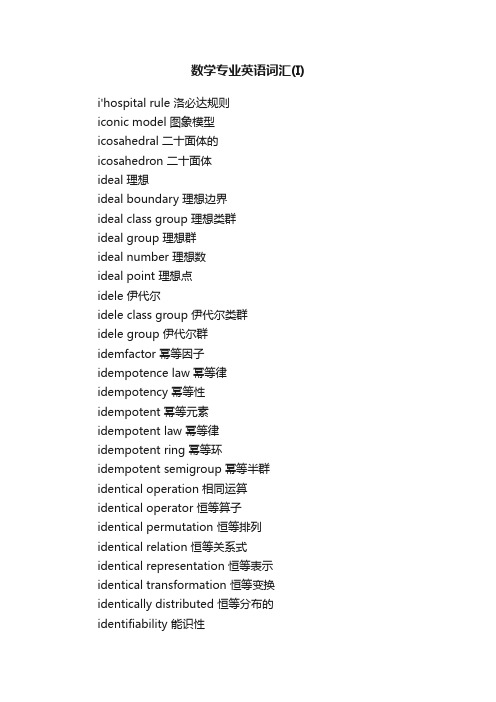
数学专业英语词汇(I)i'hospital rule 洛必达规则iconic model 图象模型icosahedral 二十面体的icosahedron 二十面体ideal 理想ideal boundary 理想边界ideal class group 理想类群ideal group 理想群ideal number 理想数ideal point 理想点idele 伊代尔idele class group 伊代尔类群idele group 伊代尔群idemfactor 幂等因子idempotence law 幂等律idempotency 幂等性idempotent 幂等元素idempotent law 幂等律idempotent ring 幂等环idempotent semigroup 幂等半群identical operation 相同运算identical operator 恒等算子identical permutation 恒等排列identical relation 恒等关系式identical representation 恒等表示identical transformation 恒等变换identically distributed 恒等分布的identifiability 能识性identification 同化identification map 粘合映射identification of the first kind 第一类粘合identification topology 同化拓扑identities of kronecker 克罗内克恒等式identity 恒等式identity element 单位元identity function 恒等函数identity graph 恒等图identity map 恒等映射identity operator 恒等算子identity permutation 恒等排列identity theorem 恒等定理if and only if 当且仅当ill conditioned 病态的ill conditioned matrix 病态阵ill posed problem 不适定问题illusory correlation 产生错觉相关image 象集image point 象点image set 象集image space 象空间imaginary 虚数imaginary axis 虚轴imaginary circle 虚圆imaginary ellipsoid 虚椭圆面imaginary number 虚数imaginary part 虚部imaginary plane 虚平面imaginary point 虚点imaginary root 虚根imaginary sphere 虚球imaginary unit 虚数单位imbalance 不稳定imbedded prime ideal 嵌入素理想imbedding 嵌入imbedding method 嵌入法imbedding theorem 嵌入定理immeasurability 非可测的immeasurable 不可度量的immediate 直接的immediate inference 直接推理immediate predecessor 直前仟immediate successor 紧接后元immersed manifold 浸入的廖immersed submanifold 浸入的子廖immersed variety 浸入的廖immersion 浸入impact matrix 碰撞矩阵imperfect field 不完全域implicate 蕴涵implication 蕴涵implicit 隐含的implicit definition 隐定义implicit difference scheme 隐式差分格式implicit differential equation 隐式微分方程implicit differentiation 隐微分法implicit function 隐函数implicit function theorem 隐函数定理imponderability 不可称量性impossibility proof 不可能性证明impossible event 不可能事件impredicative definition 非断言定义imprimitive group 非本原群improper 非正常的improper differentiability 非正常可微性improper divergence 非正常发散improper face 假面improper fraction 假分数improper fractional function 假分数函数improper function 拟函数improper integral 反常积分improper integral of the first kind 第一种反常积分improper limit value 非正常极限值improper orthogonal matrix 非正常正交阵improper rotation 非正常旋转improper singularity 非正常奇点improper symbol 非正常符号improperly integrable function 反常可积函数impulse response 脉冲响应impulsion 脉冲imputation 分配in counter clockwise direction 反时针方向in terms by terms 逐项地inaccessible boundary point 不可达边界点inaccessible element 不可达元素inaccessible number 不可达数inaccessible ordinal 不可达序数inaccuracy 不精密incenter 内心incentre 内心inch 英寸incidence 关联incidence angle 入射角incidence formula 关联公式incidence matrix 关联矩阵incidence number 关联数incidence relation 关联关系incircle 内切圆inclination 倾斜inclination of a line 直线的倾角inclined plane 斜面include 包含included angle 夹角inclusion 包含inclusion functor 包含函子inclusion map 包含映射inclusion relation 包含关系incommensurability 不能通约incommensurable quantities 不可通约量incommensurable segments 不可通约线段incompatibility 不相容性incompatible equations 不相容方程incomplete beta function 不完全函数incomplete equation 不完全方程incomplete factorial function 不完全阶乘函数incomplete gamma function 不完全函数incomplete induction 不完全归纳法incomplete polynomial 不完全多项式incompleteness 不完全性incompleteness theorem 不完全性定理incompressibility 非压缩性incompressible 不可压缩的incongruent 不同余的inconsistency 不一致性inconsistent equations 不相容方程inconsistent estimator 不相容估计量inconsistent formal system 不相容形式系统incorrect proposition 错误命题increase 增加increasing directed set 上方有向集increasing function 增函数increasing progression 递增级数increasing sequence 增序列increasing series 递增级数increasing transfinite sequence 递增超限序列increment 增量increment of a function 函数的增量indecomposable 不可分解的indefinable 难下定义的indefinite form 不定形式indefinite integral 不定积分的indefinite operator 不定算子indefinite total variation 不定全变差indefiniteness 无定性indegree 入度independence 独立independence from path 从路独立性independent axioms 独立公理independent events 独立事件independent sampling 独立抽样independent set 独立集independent system 独立系independent tests 独立检验independent variable 自变量indeterminacy 不确定性indeterminancy principle 测不准原理indeterminate equation 不定方程indeterminate form 不定式indeterminate system of equations 不定方程组indetermined 不定的index 解析指数index number 指数index of a radical 根式的指数index of imprimitivity 非本原指标index of inertia 惯性指数index of operator 算子的指数index of speciality 特性的指数index set 指标集index theorem 指数定理indexing 标引indicator function 指标函数indicator function of event 事件的指标函数indicatrix 标形indicial equation 决定方程indifference region 无差别区域indirect numerical method 间接数值法indirect proof 间接证明indirect sampling 间接抽样indiscrete space 密着空间indiscrete topology 密着拓扑individual 个体individual ergodic theorem 个体遍历定理indivisible 除不尽的indivisible element 除不尽元素induce 诱导induced bundle 诱导纤维丛induced cohomology homomorphism 导出上同调induced fiber bundle 诱导纤维丛induced homomorphism 导出同态induced topology 诱导拓扑induction 归纳induction hypothesis 归纳假设induction method 归纳法induction rule 归纳规则induction step 归纳步骤induction variable 归纳变量inductional assumption 归纳假设inductive dimension 归纳维数inductive limit 归纳限inductive system 归纳系inductively ordered set 归纳有序集inequalities in physics 物理学中的不等式inequality 不等式inequality constraint 不等式约束inequality sign 不等号inequilateral 不等边的inertia 惯性inertia group 惯性群inertial force 惯性力inertial system 惯性系inference 推论inference pattern 推理模型inferior limit 下极限infimum 最大下界infinite 无穷的infinite decimal 无尽小数infinite dimensional 无限维的infinite distributivity 无限分配性infinite half plane 半无限平面infinite induction 无限归纳infinite integral 第一种反常积分infinite interval 无限区间infinite matrix 无限矩阵infinite of the same order 同阶无穷大infinite place 无限位infinite point 无限远点infinite product 无穷乘积infinite progression 无穷级数infinite sequence 无限序列infinite series 无穷级数infinite set 无限集infinite space 无限空间infinite system of differential equations 无穷微分方程组infinite system of linear equations 无穷线性方程组infinitely continuously derivable function 无限次连续可微函数infinitely divisible distribution 无穷可分分布infinitely divisible measure 无穷可分测度infinitely divisible variate 无穷可分变量infinitely near point 无限接近点infinitely small 无穷小的infinitesimal 无穷小infinitesimal analysis 微积分infinitesimal calculus 微积分infinitesimal contact transformation 无穷小切变换infinitesimal deformation 无穷小形变infinitesimal displacement 无穷小位移infinitesimal generator 无穷小算子infinitesimal operator 无穷小算子infinitesimal quantity 无穷小infinitesimal rigidity 无穷小刚性infinitesimal rotation 无穷小旋转infinitesimal transformation 无穷小变换infinity 无穷大inflation 膨胀inflection 拐折inflexion 拐折inflexional asymptote 拐渐近线inflexional tangent 拐切线influence 影响information processing 信息处理information set 信息集information source 信息源information theory 信息论inhomogeneity 不均匀性inhomogeneous 非齐次的inhomogeneous coordinates 非齐次坐标inhomogeneous equation 非齐次方程inhomogeneous integral equation 非齐次积分方程inhomogeneous lorentz group 非齐次络论茨群initial 初始的initial approximation 初始近似initial condition 初始条件initial data 原始数据initial distribution 初始分布initial error 初始错误initial manifold 初始廖initial phase 初相initial point 始点initial position 初始位置initial set 始集initial solution 初始解initial state 初态initial strip 初始带initial term 初项initial value 初值initial value problem 柯问题initial value theorem 初值定理initial velocity 初速度initial vertex 初始顶点injection 单射injective dimension 单射维数injective envelope 单射包络injective mapping 单射injective object 单射对象injectivity 内射性inner automorphism 内自同构inner capacity 内容量inner derivation 内部求导inner normal 内法线inner point 内点inner product 纯量积inner product module 内积模inner product space 内积空间innumerability 无数innumerable 无数的input 入口input alphabet 输入字母input device 输入装置input error 输入数据误差input flow 输入流input function 输入函数input routine 输入程序input signal 输入信号input state 输入状态input unit 输入装置input variable 输入值inradius 内径inscribe 内接inscribed angle 圆周角inscribed circle 内切圆inscribed polygon 内接多边形inscribed quadrangle 内接四边形inscribed tetragon 内接四边形inscribed triangle 内接三角形inseparable 不可分的inseparable degree 不可分次数inseparable element 不可分元inseparable extension 不可分扩张inseparable isogeny 不可分同种inseparable polynomial 不可分多项式insertion 嵌入inside 内部的insoluble equation 不可解方程instability 不稳定性instability constant 不稳定常数instantaneous velocity 瞬时速度instruction 指令instruction address 指令地址instruction code 指令码instruction register 指令寄存器instruction system 指令系统instruction word 指令码insurance 保险insurance calculus 保险演算insurance mathematics 保险数学integer 整数integer linear optimization 整数线性最优化integer optimization 整数规划integer part 整数部分integer polyhedron 整数多面体integer programming 整数规划integer solution 整数解integer valued function 整数值函数integrability 可积性integrability conditions 可积条件integrability in the sense of riemann 黎曼可积性integrable 可积的integrable function 可积函数integral 积分integral calculus 积分学integral closure 整闭包integral conoid 积分劈锥面integral cosine 余弦积分integral criterion 积分判别准则integral curvature 总曲率integral curve 积分曲线integral domain 整环integral element 积分元素integral equation 积分方程integral exponential 积分指数integral formula 积分公式integral formula of cauchy 柯锡分公式integral function 整函数integral geometry 积分几何学integral homology functor 整同弹子integral homology group 整同岛integral homology theory 整同帝integral ideal 整理想integral inequality 积分不等式integral invariant 积分不变式integral kernel 积分核integral logarithm 积分对数integral number 整数integral of a differential equation 微分方程的积分integral of a function 函数的积分integral operator 积分算子integral part 整数部分integral point 整点integral quaternion 整四元数integral rational function 整有理函数integral relation 积分关系integral representation 积分表示;整数表示integral sign 积分符号integral strip 积分带integral surface 积分曲面integral table 积分表integral theorem 积分定理integral theorem of cauchy 柯锡分定理integral transcendental function 整超越函数integral transform 积分变换integral vector 积分向量integrand 被积函数integraph 积分仪integrate 积分integrating factor 积分因子integrating wheel 积分轮integration 积分integration by parts 分部积分法integration by substitution 代换积分法integration constant 积分常数integration operator 积分算子integration term by term 逐项积分integration theory 积分论integration variable 积分变数integrator 积分仪integrimeter 求积仪integro differential equation 积分微分方程integro differential operator 积分微分算子intension 内涵intensity 强度interchange 交换interclass correlation 组内相关interest rate 利率interference 干涉interference function 干涉函数interior 内部interior alternate angles 内错角interior angle 内角interior approximation 内逼近interior boundary problem 内边值问题interior cross sectional measure 内截面测度interior domain 内域interior edge 内部棱interior lebesgue measure 勒贝格内测度interior mapping 开映射interior measure 内测度interior normal 内法线interior of domain 域的内部interior opposite angle 内对角interior point 内点interior problem 内边值问题interior surface 内面intermediate convergent 中间渐近分数intermediate differential 中间微分intermediate field 中间域intermediate fraction 中间渐近分数intermediate group 中间群intermediate integral 中间积分intermediate language 中间语言intermediate result 中间结果intermediate value 介值intermediate value theorem 介值定理intermediate variable 中间变量internal division 内分internal memory 内存储器internal ratio 内比internal storage 内存储器internal store 内存储器internal tangent of two circles 二圆的内切线internal transformation 内点变换internal vertex 内部顶点internally tangent 内切的international system of units 国际单位制interpenetrating samples 互相负穿样本interpolate 插值interpolating spline function 内插样条函数interpolation 插值interpolation error 插值误差interpolation formula 插值公式interpolation function 插值函数interpolation method 插值法interpolation of operators 算子插值interpolation polynomial 插值多项式interpolation problem 插值问题interpolation quadrature formula 插值求积公式interpretater routine 解释程序interpretation 解释interquartile range 四分位数间距intersect 交intersect transversally 相交横截intersecting lines 相交线intersection 交intersection chart 网络图intersection graph 相交图intersection multiplicity 相交重数intersection number 交数intersection point 交点intersection ring 交环intersection theorems 相交定理intersectionproduct 交叉积interval 区间interval algebra 区间代数interval analysis 区间分析interval closed at the right 右闭区间interval estimation 区域估计interval function 区间函数interval graph 区间图interval of convergence 收敛区间interval of definition 定义区间interval topology 区间拓扑intra class correlation 同类相关intra class correlation coefficient 同类相关系数intransitive group 非可迁群intransitive relation 非可递关系intransitivity 非可迁性intrinsic geometry 内蕴几何学intrinsic property 内蕴性质intuition 直观intuitionism 直觉皱intuitionist logic 直觉皱逻辑intuitionistic 直觉皱的intuitive 直观的invariability 不变invariable 不变的invariance 不变性invariance theorem 不变性定理invariant 不变式invariant continuation 不变开拓invariant element 不变元invariant factor 不变因子invariant lie subgroup 不变李子群invariant measure 不变测度invariant of an equation 方程的不变量invariant property 不变性invariant set 不变集invariant subalgebra 不变子代数invariant subgroup 不变子群invariant subset 不变子集invariant subspace 不变子空间invariant test 不变检定invariant theory 不变量理论inventory control 库存管理论inverse 逆元inverse calculation 逆计算inverse circular function 反三角函数inverse correspondence 逆对应inverse cosecant 逆余割inverse cosine 逆余弦inverse cotangent 逆余切inverse curve 反曲线inverse element 逆元inverse figure 逆图形inverse form 逆形式inverse fraction 反分数inverse function 反函数inverse hyperbolic function 反双曲函数inverse image 逆象inverse interpolation 逆插法inverse isomorphism 反同构inverse isoperimetric problem 逆等周问题inverse isotone mapping 逆保序映射inverse laplace transform 逆拉普拉斯变换inverse laplace transformation 拉普拉斯逆变换inverse limit 逆向极限inverse logarithm 反对数inverse mapping 逆映射inverse matrix 逆阵inverse number 反数inverse operation 逆运算inverse operator 逆算子inverse permutation 逆置换inverse polish notation 逆波兰表示法inverse problem 逆问题inverse proportion 反比inverse proposition 逆命题inverse quaternion 反四元数inverse relation 逆关系inverse secant 反正割inverse similarity 逆相似性inverse sine 逆正弦inverse spectrum 逆谱inverse square law 平方反比定律inverse system 逆向系inverse tangent 反正切inverse theorem 逆定理inverse transformation 反变换inverse trigonometric function 反三角函数inverse value 逆值inverse vector iteration 逆向量迭代inversely proportional quantities 反比例量inversely well ordered set 逆良序集inversion 反演inversion formula 反演公式inversion of a point 点的反演inversion principle 反演原理inversion problem 反演问题inversion theorem 反演定理inversor 反演器invert 翻转invertibility 可逆性invertible element 可逆元invertible fractional ideal 可逆分式理想invertible map 可逆映射invertible matrix 可逆矩阵invertible module 可逆加法群invertible operator 可逆算子invertible sheaf 可逆层invertible transformation 可逆变换involute 渐伸线involution 对合involutorial anti automorphism 对合反自同构involutory algebra 对合代数involutory matrix 对合矩阵involutory system 对合系involve 包含irrational 无理的irrational algebraic expression 无理代数式irrational equation 无理方程irrational fraction 无理分数irrational function 无理函数irrational number 无理数irrationality 无理性irreducibility 既约性irreducibility criterion 不可约性判别准则irreducible 不可约的irreducible algebraic correspondence 不可约代数对应irreducible algebraic variety 不可约代数簇irreducible branch 不可约分支irreducible case 不可约情形irreducible character 不可约特贞irreducible constituent 不可约组成成分irreducible curve 不可约曲线irreducible element 不可约元irreducible equation 不可约方程irreducible factor 不可约因子irreducible generating set 不可约生成集irreducible markov chain 不可约马尔可夫链irreducible matrix 不可约阵irreducible polynomial 不可约多项式irreducible proof 不可约证明irreducible quadratic form 不可约二次形式irreducible r module 不可约r模irreducible representation 不可约表示irreducible set 不可约集irreflexible 不反射的irreflexive relation 非自反关系irreflexively partially ordered set 非自反半序集irreflexivity 反自反性irregular 不正则的;不规则的irregular birational transformation 非正则双有理变换irregular divisor class 非正则因子类irregular point 非正则点irregular singular point 非正则奇点irregularity 非正则性irreversibility 不可逆性irreversible 不可逆的irreversible process 不可逆过程irrotational 无旋的irrotational vector field 无涡向量场isobaric surface 等压面isochronous curve 等时曲线isogeneous algebraic group 同种代数群isogeny 同种isogon 等角多角形isogonal 等角的isogonal affine transformation 等角仿射变换isogonal conformal mapping 等角映射isogonal conformal transformation 等角映射isogonal conjugate lines 等角共轭线isogonal trajectory 等角轨线isogonal transformation 保角映射isogonality 等角变换isohypse 等压等高线isolate 抽数isolated element 孤立元素isolated point 孤点isolated prime ideal 孤立素理想isolated set 离散集isolated singular point 孤立奇点isolated subgroup 孤立子群isolated vertex 孤立项点isometric 同度量的isometric chart 等距图isometric circle 等距圆isometric embedding 等距嵌入isometric form 等距形式isometric mapping 等距映射isometric operator 等距算子isometric space 等距空间isometric stereogram 等距图isometric surface 等距曲面isometric transformation 同度量度换isometry 等距映射isomorphic 同构的isomorphic complex 同相复形isomorphic field 同构域isomorphic graph 同构图isomorphic group 同构群isomorphic image 同构象isomorphic map 同构象isomorphic mapping 同构映射isomorphic partially ordered set 同构半序集isomorphism 同构isomorphism class 同构类isomorphism condition 同构条件isomorphism invariant 同构不变量isomorphism problem 同构问题isomorphism theorems 同构定理isomorphism theorems of group theory 群论的同构定理isomorphism type 同构型isoperimetric 等周的isoperimetric figure 等周形isoperimetric inequality 等周不等式isoperimetric parameter 等周参数isoperimetric problem 等周问题isopleth 等值线isoptic curve 切角曲线isosceles 等腰的isosceles trapezoid 等腰梯形isosceles triangle 等腰三角形isotherm 等温线isothermal parameter 等温参数isothermal parameter curve 等温参数曲线isothermal surface 等温曲面isothermalasymptotic surface 等温渐近曲面isothermic system of curves 等温曲线系isotone mapping 保序映射isotone transformation 保序变换isotone valuation 保序赋值isotonic injective mapping 保序单射映射isotonic mapping 保序映射isotony 保序性isotopic embedding 合痕嵌入isotopic figure 合痕图形isotopic groupoid 合痕广群isotopic knot 合痕纽结isotopic quasi fields 合痕拟域isotopy 合痕isotopy class 合痕类isotopy invariant 合痕不变式isotopy type 合痕型isotropic 蛤同性的isotropic body 蛤同性体isotropic cone 迷向锥面isotropic curvature 迷向曲率isotropic curve 迷向曲线isotropic line 迷向线isotropic matter 蛤同性物质isotropic surface 迷向曲面isotropic vector 迷向向量isotropy 迷向isotropy group 迷向群isthmus 分离棱iterate 迭代iterated function 叠函数iterated integral 累积分iterated kernel 叠核iterated limit 迭代极限iterated logarithm 叠对数iterated series 叠级数iterating 重复iteration 迭代iteration loop 迭代循环iteration method 迭代法iteration step 迭代步iterative computation 迭代计算iterative method 迭代法iterative method for eigenvalue problems 特盏问题迭代法iwasawa decomposition 伊娃沙娃分解。
数学专业英语

数学专业英语数学专业英语课后答案2.1数学、方程与比例词组翻译1.数学分支branches of mathematics,算数arithmetics,几何学geometry,代数学algebra,三角学trigonometry,高等数学higher mathematics,初等数学elementary mathematics,高等代数higher algebra,数学分析mathematical analysis,函数论function theory,微分方程differential equation2.命题proposition,公理axiom,公设postulate,定义definition,定理theorem,引理lemma,推论deduction3.形form,数number,数字numeral,数值numerical value,图形figure,公式formula,符号notation(symbol),记法/记号sign,图表chart4.概念conception,相等equality,成立/真true,不成立/不真untrue,等式equation,恒等式identity,条件等式equation of condition,项/术语term,集set,函数function,常数constant,方程equation,线性方程linear equation,二次方程quadratic equation5.运算operation,加法addition,减法subtraction,乘法multiplication,除法division,证明proof,推理deduction,逻辑推理logical deduction6.测量土地to measure land,推导定理to deduce theorems,指定的运算indicated operation,获得结论to obtain the conclusions,占据中心地位to occupy the centric place 汉译英(1)数学来源于人类的社会实践,包括工农业的劳动,商业、军事和科学技术研究等活动。
数学专业英语
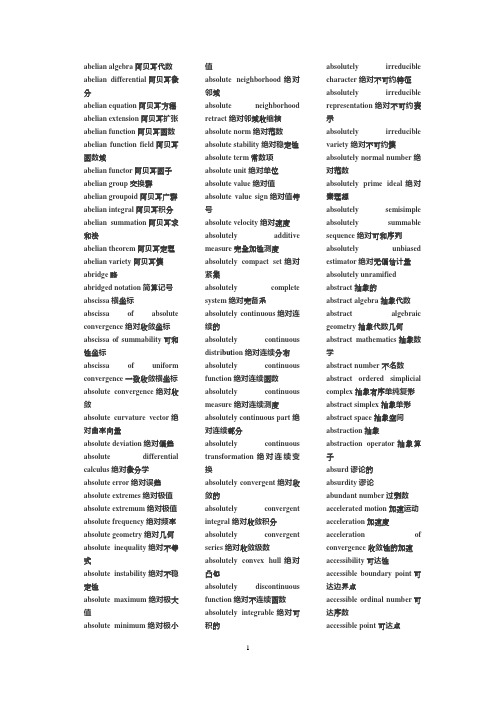
abelian algebra 阿贝耳代数abelian differential 阿贝耳微分abelian equation 阿贝耳方程abelian extension 阿贝耳扩张abelian function 阿贝耳函数abelian function field 阿贝耳函数域abelian functor 阿贝耳函子abelian group 交换群abelian groupoid 阿贝耳广群abelian integral 阿贝耳积分abelian summation 阿贝耳求和法abelian theorem 阿贝耳定理abelian variety 阿贝耳簇abridge 略abridged notation 简算记号abscissa 横坐标abscissa of absolute convergence 绝对收敛坐标abscissa of summability 可和性坐标abscissa of uniform convergence 一致收敛横坐标absolute convergence 绝对收敛absolute curvature vector 绝对曲率向量absolute deviation 绝对偏差absolute differential calculus 绝对微分学absolute error 绝对误差absolute extremes 绝对极值absolute extremum 绝对极值absolute frequency 绝对频率absolute geometry 绝对几何absolute inequality 绝对不等式absolute instability 绝对不稳定性absolute maximum 绝对极大值absolute minimum 绝对极小值absolute neighborhood 绝对邻域absolute neighborhoodretract 绝对邻域收缩核absolute norm 绝对范数absolute stability 绝对稳定性absolute term 常数项absolute unit 绝对单位absolute value 绝对值absolute value sign 绝对值符号absolute velocity 绝对速度absolutely additivemeasure 完全加性测度absolutely compact set 绝对紧集absolutely completesystem 绝对完备系absolutely continuous 绝对连续的absolutely continuousdistri but ion 绝对连续分布absolutely continuousfunction 绝对连续函数absolutely continuousmeasure 绝对连续测度absolutely continuous part 绝对连续部分absolutely continuoustransformation 绝对连续变换absolutely convergent 绝对收敛的absolutely convergentintegral 绝对收敛积分absolutely convergentseries 绝对收敛级数absolutely convex hull 绝对凸包absolutely discontinuousfunction 绝对不连续函数absolutely integrable 绝对可积的absolutely irreduciblecharacter 绝对不可约特征absolutely irreduciblerepresentation 绝对不可约表示absolutely irreduciblevariety 绝对不可约簇absolutely normal number 绝对范数absolutely prime ideal 绝对素理想absolutely semisimpleabsolutely summablesequence 绝对可和序列absolutely unbiasedestimator 绝对无偏估计量absolutely unramifiedabstract 抽象的abstract algebra 抽象代数abstract algebraicgeometry 抽象代数几何abstract mathematics 抽象数学abstract number 不名数abstract ordered simplicialcomplex 抽象有序单纯复形abstract simplex 抽象单形abstract space 抽象空间abstraction 抽象abstraction operator 抽象算子absurd 谬论的absurdity 谬论abundant number 过剩数accelerated motion 加速运动acceleration 加速度acceleration ofconvergence 收敛性的加速accessibility 可达性accessible boundary point 可达边界点accessible ordinal number 可达序数accessible point 可达点accessible set 可达集accessible vertex 可达顶点accidental 偶然的accidental coincidence 偶然符合accumulating point 聚点accumulation 累积accumulation point 聚点accuracy 准确性accuracy grade 准确度accuracy of measurement 测量精确度accuracy rating 准确度acnod 孤点acount 计算actual 真实的actual infinity 实无穷acute 尖锐的acute angle 锐角acute angled triangle 锐角三角形acute triangle 锐角三角形acuteness 锐度acyclic 非循环的ad infinitum 无穷地adaptability 适应性adaptation 适应add 加addend 加数addition 加法addition formulas 加法公式addition sign 加号addition system 加法系addition table 加法表addition theorem 加法定理addition theorem of probability 概率的加法定理additional 加法的additional code 附加代码additional condition 附加条件additional error 附加误差additive 加法的additive functional 加性泛函数additive functionaltransformation 加性泛函变换additive group 加法群additive interval function 加性区间函数additive operator 加性算子additive process 加性过程additive relation 加性关系additive separable 加法可分的additive valuation 加法赋值additively commutativeordinal numbers 加性交换序数additivity 加法性address 地址adele 阿代尔adele group 阿代尔群adequate 适合的adherent point 触点adhesion 附着adjacency 邻接adjacency matrix 邻接矩阵adjacent angles 邻角adjacent edge 邻棱adjacent side 邻边adjacent supplementaryangles 邻角adjacent vertex 邻顶adjoint determinant 伴随行列式adjoint form 伴随形式adjoint function 伴随函数adjoint functor 伴随函子adjoint hilbert problem 伴随希耳伯特问题adjoint kernel 伴随核adjoint linear map 伴随线性映射adjoint matrix 伴随阵adjoint operator 伴随算子adjoint space 伴随空间adjoint transformation 伴随算子adjoint vector 伴随向量adjunct 代数余子式adjunction 附加adjunction of an identityaffine coordinates 平行坐标affine curvature 仿射曲率affine differentialgeometry 仿射微分几何学affine distance 仿射距离affine figure 仿射图形affine function 仿射函数affine geometry 仿射几何学affine group 仿射群affine group scheme 仿射群概型affine length 仿射长度affine line 仿射直线affine normal 仿射法线affine parameter 仿射参数affine space 仿射空间affine sphere 仿射球面affine surface 仿射曲面affine transformation 仿射变换affine variety 仿射簇affinely connectedmanifold 仿射连通廖affinely connected space 仿射连通空间affinity 仿射变换affirmation 肯定affirmative proposition 肯定命题affix 附标aggregate 集aggregation 聚合agreement 一致air coordinates 空间坐标alexander matrix 亚历山大阵alexander polynomial 亚历山大多项式algebra 代数学algebra of events 事件场algebra of logic 逻辑代数algebraic calculus 代数计算algebraic closure 代数闭包algebraic closure operator 代数闭包算子algebraic complement 代数余子式algebraic curve 代数曲线algebraic equation 代数方程algebraic expression 代数式algebraic extension 代数扩张algebraic form 代数形式algebraic fraction 代数分式algebraic function 代数函数algebraic function field 代数函数域algebraic geometry 代数几何学algebraic group 代数群algebraic hull 代数包algebraic hypersurface of the algebraic integer 代数整数algebraic multiplicity 代数重度algebraic number 代数数algebraic number field 代数数域algebraic number theory 代数数论algebraic operation 代数运算algebraic polynomial 代数多项式algebraic singularity 代数奇点algebraic space 代数空间algebraic spiral 代数螺线algebraic structure 代数结构algebraic sum 代数和algebraic system 代数系algebraic variety 代数簇algorithm 算法algorithm of division 辗转相除法algorithm of euclid 欧几里得算法algorithm theory 算法论algorithmic language 算法语言algorithmization 算法化aliquot part 整除部分allowance 允许almost all 几乎处处almost certainconvergence 几乎必然收敛almost everywhere 几乎处处almost impossible event 殆不可能事件alpha limit set 极限集alphabetical 字母的alphanumeric 字母数字式alphanumeric representationof alternating function 反对称函数alternating group 交错群alternating harmonicseries 莱布尼兹级数alternating matrix 交错矩阵alternating method 交错法alternating product 外积alternating sequence 交错序列alternating series 交错级数alternating series test 交错级数检验alternating sum 交错和altitude 高度altitude theorem 高度定理amalgamated product 融合积amalgamated subcategory 融和子范畴amalgamation 合并ambient space 环绕空间ambiguous point 歧点amicable numbers 亲和数amount 量amphicheiral knot 双向纽结amplitude 振幅;角amplitude of a complexnumber 复数角analog computer 模拟计算机analogous 类似的analogue display 相似表示analogue method 相似法analogy 类似analysis 数学分析analysis of time series 时间序列分析analytic 分析的analytic curve 解析曲线analytic expression 解析式analytic function 分析函数analytic function of severalanalytic proof 解析证明analytic proposition 解析命题analytic set 解析集analytic space 解析空间analytic transformation 解析变换analytical differential 解析微分analytical geometry 分析几何学angle 角angle at center 圆心角angle between chord andtangent 弦和切线的角angle function 角函数angle of contact 接触角angle of contingence 切线角angle of declination 俯角angle of diffraction 衍射角angle of incidence 入射角angle of inclination 斜角angle of intersection 相交角angle of lead 超前角angle of reflection 反射角angle of refraction 折射角angle of rotation 旋转角angle of torsion 挠率角angle preserving 保角的angle preserving map 保角映象angular 角的angular acceleration 角加速度angular velocity 角速度anti automorphism 反自同构anti hermitian form 反埃尔米特形式anti isomorphic lattice 反同构格anti isomorphism 反同构anti position 反位置anti reflexiveness 反自反性anti semiinvariant 反半不变量antianalytic function 反解析函数antichain 反链anticlockwise 逆时针的anticlockwise revolution 逆时针回转anticlockwise rotation 逆时针回转anticoincidence 反重合anticoincidence method 反重法anticommutation 反交换anticommutative 反交换的anticommutativity 反交换性anticommutator 反换位子antiderivative 不定积分的antiholomorphic 反全纯的antihomomorphism 反同态antiisomorphy 反同构antilinear 反线性的antilinear mapping 反线性映射antilinear transformation 反线性变换antiorder homomorphism operator 反序同态算子antiordered set 反有序集合antiparallel 逆平行的antiplane 反平面antipodal map 对映映射antipodal point 对映点antipodal set 对映集antipode 对映点antipoints 反点antisymmetric 反对称的antisymmetric function 反对称函数antisymmetric matrix 反对称矩阵antisymmetric relation 反对称关系antitone mapping 反序映射antitone sequence 反序列antitonic function 反序函数antitonicity 反序性antitony 反序性antitrigonometric function 反三角函数antiunitary 反酉的apex 顶点apex angle 顶角apical angle 顶角application 应用applied mathematics 应用数学approach 接近approach infinity 接近无穷大approximability 可逼近性approximable 可逼近的approximate 近似的;使近似approximate calculation 近似计算approximate construction 近似准approximate continuity 近似连续性approximate derivative 近似导数approximatedifferentiability 近似可微性approximate differential 近似微分approximate formula 近似公式approximate integration 近似积分approximate limit 近似极限approximate lower semicontinuity 近似下半连续性approximate method 近似法approximate number 近似数approximate partialderivative 近似偏导函数approximate partial derivedfunction 近似偏导函数approximate partialdifferential 近似偏微分approximate solution 近似解approximate totaldifferentiability 近似全可微性approximate totaldifferential 近似全微分approximate upper semicontinuity 近似上半连续性approximate value 近似值approximate value inexcess 过剩近似值approximately equal 近似等于approximatelysemicontinuous 近似半连续的approximation 逼近approximation by excess 过剩逼近approximation calculus 近似计算approximation error 近似误差approximation function 逼近函数approximation in excess 过剩逼近approximation method 近似法approximation methods in physics 物理学中的逼近法approximation theorem 逼近定理approximation theory 逼近理论arbitrarily small 任意小arbitrary 任意的arbitrary constant 任意常数arbitrary element 任意元素arbitrary parameter 任意参数arbitrary small number 任意小数arc 弧arc tangent 反正切arch 拱形archimedean 阿基米德性的archimedean group 阿基米德群archimedean semigroup 阿基米德半群archimedean space 阿基米德空间archimedean total order 阿基米德全序archimedean valuation 阿基米德赋值archimedes axiom 阿基米德公理archimedically ordered field 阿基米德有序域archimedically ordered number field 阿基米德有序数域arcwise connected set 弧连通集arcwise connected space 弧连通空间arcwise connectedness 弧连通性are 公亩area 面积area function 面积函数area of a circle 圆面积area preserving mapping 保面积映射areal coordinates 重心坐标argand plane 复数平面argument 自变数;辐角argument function 辐角函数argument of a function 函数的自变数argument principle 辐角原理argumentation 论证aristotelian logic 亚里斯多德逻辑学arithmetic 算术arithmetic al function 数论函数arithmetic difference 算术差arithmetic division 算术除法arithmetics 算术arithmetization 算术化arithmometer 四则计算机arrangement 排列array 排列arrow 射artificial variable 人工变量artificial variable method 人工变量法associate equation 相伴方程associated equation 相伴方程associated homogeneoussystem 相伴齐次组associated legendrefunction 相伴勒让德函数associated legendrepolynomial 连带的勒让德多项式associated minimalsurface 相伴极小曲面associated power series 相伴幂级数associated prime ideal 相伴素理想associated radius ofconvergence 相伴收敛半径associated space 相伴空间associated system 相伴系associated undirectedgraph 相伴无向图association 结合associative algebra 结合代数associative law 结合律associative law for series 级数的结合律associativity 结合性assume 假定assumption 假定assumption formula 假定公式asterisk 星号asteroid 星形线asymmetric 非对称的asymmetric relation 非对称关系asymmetric variety 非对称簇asymmetrical 非对称的asymmetry 非对称性asymptote 渐近线asymptote of curve 曲线的渐近线asymptotic 浙近的asymptotic behavior 渐近状态asymptotic circle 渐近圆asymptotic cone 渐近锥面asymptotic convergence 渐近收敛asymptotic curvature 渐近曲率asymptotic curve 渐近曲线asymptotic density 渐近密度asymptotic direction 渐近方向asymptotic efficiency 渐近效率asymptotic expansion 渐近展开asymptotic formula 渐近公式asymptotic line 渐近线asymptotic mean value 渐近平均值asymptotic minimal basis 渐近极小基asymptotic order 渐近阶asymptotic path 渐近路线asymptotic plane 渐近平面asymptotic point 渐近点asymptotic rate of convergence 渐近收敛速度asymptotic series 渐近级数asymptotic solution 渐近解asymptotic stability 渐近稳定性asymptotic surface 渐近曲面asymptotic unbiased estimator 渐近无偏估计量asymptotic value 渐近值asymptotically efficient estimator 渐近有效估计量asymptotically equal 渐近相等asymptotically equal sequence 渐近相等序列asymptotically equivalent function 渐近等价函数asymptotically normal distri but ion 渐近正态分布asymptotically normally distri but ed 渐近正规分布的asymptotically stable 渐近稳定的asymptotically stable solution 渐近稳定解atom 原子atomic element 原子元素atomic formula 原子公式atomic lattice 原子格atomic proposition 原子命题atomicity 原子性augmented matrix 增广矩阵austausch 交换autocorrelation 自相关automorphism 自同构automorphism group 自同构群autonomous system 自治系统autoregressivetransformation 自回归变换auxiliary 辅助的auxiliary angle 辅助角auxiliary circle 辅助圆auxiliary equation 相伴齐次方程auxiliary function 辅助函数auxiliary line 辅助线auxiliary variable 辅助变数average 平均值average deviation 平均偏差average error 平均误差axial 轴的axial symmetry 轴对称axial vector 轴向量axiom 公理axiom of accessibility 可达性公理axiom of addition 加法公理axiom of choice 选择公理axiom of completeness 完备性公理axiom of comprehension 概括公理axiom of constructibility 可构成性公理axiom of constructivity 可构成性公理axiom of continuity 连续公理axiom of regularity 正则性公理axiom of subsets 子集公理axiom of substitution 替换公理axiom of sum set 并集公理axiom of the empty set 空集公理axiom of union 并集公理axiom scheme 公理格式axiomatic 公理的axiomatic method 公理法axiomatic set theory 公理论的集论;公理集合论axiomatic system 公理系统axiomatics 公理学axiomatization 公理化axiomatize 公理化axioms of continuity 连续公理axioms of denumerability 可数公理axioms of incidence 关联公理axioms of order 次序公理axis 轴axis of a cone 锥轴axis of abscissas 横坐标轴axis of absoluteconvergence 绝对收敛轴axis of affinity 仿射轴axis of convergence 收敛轴axis of coordinate 坐标轴axis of curvature 曲率轴axis of ordinates 纵坐标轴axis of projection 射影轴axis of reals 实轴axis of revolution 回转轴axis of rotation 回转轴axis of symmetry 对称轴axisymmetric 轴对称的axonometric perspective 轴测投影法axonometric projection 轴测投影法b measurability b可测性b measurable function 波莱尔可测函数babylonian numerals 巴比伦数字back substitution 逆计算backward difference 后向差分backward difference operator 后向差分算子backward difference quotient 后向差商backward solution 后向解法baire function 贝利函数baire measure 贝利测度baire set 贝利集baire space 贝利空间baire theorem 贝利定理balance 平衡数banach lie group 巴拿赫李群banach space 巴拿赫空间band 带band chart 带状图band matrix 带状矩阵barycentric 重心的barycentric complex 重心复形barycentric coordinates 重心坐标barycentric mapping 重心映射barycentric subdivision 重心重分base 底base angle 底角base line 底线base number 底数base of logarithms 对数的底base point 基点base space 底空间base vector 基向量basic 基础的basic block 基本块basic field 基域basic form 基本形式basic point 基础点basic representation 基本表示basic ring 基环basic solution 基本解basic symbol 基本符号basic variable 基本变量basis 基basis of linear space 线性空间的基basis of vector space 向量空间的基basis replacementprocedure 基替换过程basis theorem of hilbert 希耳伯特基定理basis vector 基本向量bayes decision function 贝叶斯判定函数bayes formula 贝叶斯公式bayes postulate 贝叶斯公设bayes solution 贝叶斯解behavior 行为bellman principle 贝尔曼原理beltrami equation 贝尔特拉米方程bending point 转向点bergman metric 伯格曼度量bernoulli equation 伯努利方程bernoulli inequality 伯努利不等式bernoulli method 伯努利法bernoulli number 伯努利数bernoulli polynomial 伯努利多项式bernoulli trials 伯努利试验bernoullian polynomial 伯努利多项式bernstein inequality 伯思斯坦不等式bernstein polynomial 伯思斯坦多项式bertrand curves 柏特龙曲线bertrand paradox 柏特龙悖论bessel equation 贝塞耳方程bessel function 贝塞耳函数bessel inequality 贝塞耳不等式bessel integral 贝塞耳积分best approximation 最佳逼近best uniformapproximation 最佳一致逼近beta distri but ion 分布beta function 函数bbicompact 紧bicompact set 紧集bicompact space 列紧空间bicompact transformationgroup 列紧变换群bicompactification 紧化biconditional 等价biconnected space 双连通空间bicontinuous function 双连续函数bicontinuouslydifferentiable 双连续可微bicylinder 双圆柱bidimensional 二维的bidimensionality 二维性bidual banach space 双对偶巴拿赫空间bifunctor 二变项函子bijection 双射bijective mapping 双射bijectivity 双射性bilateral 两面的bilateral derivative 双侧导数bilateral laplacetransform 双侧拉普拉斯变换bilaterally boundedsequence 双侧有界序列bilinear 双线性的bilinear form 双线性形式bilinear functional 双线性泛函binary arithmetic 二进制算术binary code 二进制吗binomial distri but ion 二项分布binomial equation 二项方程binomial expansion 二项展开式binomial integral 二项式积分binomial probability paper 二项式概率纸bisect 平分bisecting point 平分点bisection 平分bisector 平分线bisector of angle 角的平分线border 边缘border element 边缘元素bornological set 有界型集bornological space 有界型空间bornological topology 有界型拓扑学bornology 有界型性bound 界bound decision variable 约束决策变量boundary 边界;边缘boundary cell 边界胞腔boundary condition 边界条件boundary correspondence 边界对应boundary value problem 边值问题bounded 有界的bounded above 上有界的bounded above sequence 上有界序列bounded below 下有界的bounded below sequence 下有界序列bounded closed set 有界闭集bounded domain 有界域bounded function 有界函数bounded matrix 有界矩阵bounded minimization 有界最小化bounded operator 有界算子bounded point sequence 有界点序列bounded quantification 有界量词限制bounded quantifier 有界量词bounded sequence 有界序列bounded set 有界集合bounded to thedownwards 下有界的bounded to the upwards 上有界的bounded variation 有界变分boundedly convergentseries 有界收敛级数boundedness 有界性boundless 无限的box 框brace 大括号brachistochrone 最速降线bracket 括号break point 断点;分割点briggs' logarithm 常用对数briggsian logarithm 常用对数broken diagonal 折对角线broken line 折线broken number 分数bus 母线byte 字节calculability 可计算性calculable mapping 可计算映射calculable relation 可计算关系calculate 计算calculating automaton 计算自动机calculation 计算calculation of areas 面积计算calculator 计算机calculus 演算calculus ofapproximations 近似计算calculus of probability 概率calculus of variations 变分法calibration 校准cancel 消去cancellation 消去cancellation law 消去律cancellation property 消去性质cancelling of significantfigures 有效数字消去canonical coordinates 标准坐标canonical correlationcoefficient 典型相关系数canonical decomposition 标准分解canonical form 标准型canonical function 标准函数canonical fundamentalsystem 标准基本系统canonical hyperbolicsystem 典型双曲线系canonical mapping 标准映射canonical representation 典型表示canonical sequence 标准序列canonical solution 标准解canonical system ofdifferential equations 标准微分方程组canonical variable 典型变量canonical variationalequations 标准变分方程canonical variationalproblem 标准变分问题cap 交capacity 容量card 卡片cardinal number 基数cardinal product 基数积cardioid 心脏线carrier 支柱cartesian coordinatesystem 笛卡儿坐标系cartesian coordinates 笛卡尔座标cartesian equation 笛卡儿方程cartesian folium 笛卡儿叶形线cartesian product 笛卡儿积cartesian space 笛卡儿空间category 范畴category of groups 群范畴category of modules 模的范畴category of sets 集的范畴category of topological spaces 拓扑空间的范畴catenary 悬链线catenary curve 悬链线catenoid 悬链曲面cauchy condensation test 柯微项收敛检验法center of projection 射影中心center of symmetry 对称中心centered process 中心化过程centered system of sets 中心集系centi 厘centigram 厘克centimetre 厘米central angle 圆心角central confidence interval 中心置信区间central conic 有心圆锥曲线central derivative 中心导数central difference operator 中心差分算子central divided difference 中心均差central element 中心元central extension 中心扩张central extension field 中心扩张域central limit theorem 中心极限定理central line 中线central moment 中心矩central point 中心点central processing unit 中央处理器central projection 中心射影central quadric 有心二次曲面central series 中心群列central symmetric vectorfield 中心对称向量场central symmetry 中心对称centralizer 中心化子centre 中心centre of a circle 圆心centre of gyration 旋转中心centre of projection 射影中心centre of similarity 相似中心centre of similitude 相似中心centrifugal force 离心力centripetal acceleration 向心加速度centroid 形心certain event 必然事件certainty 必然cesaro mean 纬洛平均cesaro method ofsummation 纬洛总求法chain 链chainette 悬链线chamber complex 箱盒复形chance 偶然性;偶然的chance event 随机事件chance move 随机步chance quantity 随机量chance variable 机会变量change 变化change of metrics 度量的变换change of the base 基的变换change of the variable 变量的更换channel 信道channel width 信道宽度character 符号circulant 循环行列式circulant matrix 轮换矩阵circular 圆的circular arc 圆弧circular cone 圆锥circular correlation 循环相关circular cylinder 圆柱circular disk 圆盘circular domain 圆形域circular frequency 角频率circular functions 圆函数circular helix 圆柱螺旋线circular measure 弧度circular motion 圆运动circular neighborhood 圆邻域circular orbit 圆轨道circular pendulum 圆摆circular permutation 循环排列circular ring 圆环circular section 圆截面circular sector 圆扇形circular segment 圆弓形circular slit domain 圆形裂纹域circular symmetry 圆对称circular transformation 圆变换circulation 循环circulation index 环粮数circulation of vector field 向量场的循环circulatory integral 围道积分circumcenter 外心circumcentre 外心circumcircle 外接圆circumcone 外切圆锥circumference 圆周circumscribe 外接circumscribed circle 外接圆circumscribed figure 外切形circumscribed polygon 外切多边形circumscribedquadrilateral 外切四边形circumscribed triangle 外切三角形circumsphere 外接球cissoid 蔓叶类曲线cissoidal curve 蔓叶类曲线cissoidal function 蔓叶类函数clairaut equation 克莱罗方程class 类class bound 组界class field 类域class field tower 类域塔class frequency 组频率class function 类函数class interval 组距class mean 组平均class number 类数class of conjugate elements 共轭元素类classical groups 典型群classical lie algebras 典型李代数classical mechanics 经典力学classical sentential calculus 经典语句演算classical set theory 经典集论classical statistical mechanics 经典统计力学classical theory of probability 经典概率论classification 分类classification statistic 分类统计classification theorem 分类定理classify 分类classifying map 分类映射classifying space 分类空间clear 擦去clifford group 克里福特群clifford number 克里福特数clockwise 顺时针的clockwise direction 顺时针方向clockwise rotation 顺时针旋转clopen set 闭开集closable linear operator 可闭线性算子closable operator 可闭算子closed ball 闭球closed circuit 闭合电路closed complex 闭复形closed convex curve 卵形线closed convex hull 闭凸包closed cover 闭覆盖closed curve 闭曲线closed disk 闭圆盘closed domain 闭域closed equivalencerelation 闭等价关系closed extension 闭扩张closed filter 闭滤子closed form 闭型closed formula 闭公式closed geodesic 闭测地线closed graph 闭图closed graph theorem 闭图定理closed group 闭群closed half plane 闭半平面closed half space 闭半空间closed hull 闭包closed interval 闭区间closed kernel 闭核closed linear manifold 闭线性廖closed loop system 闭圈系closed manifold 闭廖closed map 闭映射closed neighborhood 闭邻域closed number plane 闭实数平面closed path 闭路closed range theorem 闭值域定理closed region 闭域closed riemann surface 闭黎曼面closed set 闭集closed shell 闭壳层closed simplex 闭单形closed solid sphere 闭实心球closed sphere 闭球closed star 闭星形closed subgroup 闭子群closed subroutine 闭型子程序closed surface 闭曲面closed symmetricextension 闭对称扩张closed system 闭系统closed term 闭项closeness 附近closure 闭包closure operation 闭包运算closure operator 闭包算子closure property 闭包性质clothoid 回旋曲线cluster point 聚点cluster sampling 分组抽样cluster set 聚值集coadjoint functor 余伴随函子coalgebra 上代数coalition 联合coanalytic set 上解析集coarser partition 较粗划分coaxial circles 共轴圆cobase 共基cobordant manifolds 配边廖cobordism 配边cobordism class 配边类cobordism group 配边群cobordism ring 配边环coboundary 上边缘coboundaryhomomorphism 上边缘同态coboundary operator 上边缘算子cocategory 上范畴cochain 上链cochain complex 上链复形cochain homotopy 上链同伦cochain map 上链映射cocircuit 上环道cocommutative 上交换的cocomplete category 上完全范畴cocycle 上闭键code 代吗coded decimal notation 二进制编的十进制记数法codenumerable set 余可数集coder 编器codiagonal morphism 余对角射codifferential 上微分codimension 余维数coding 编码coding theorem 编码定理coding theory 编码理论codomain 上域coefficient 系数coefficient domain 系数域coefficient function 系数函数coefficient functional 系数泛函coefficient group 系数群coefficient of alienation 不相关系数coefficient of association 相伴系数coefficient of covariation 共变系数coefficient of cubical expansion 体积膨胀系数coefficient of determination 可决系数coefficient of diffusion 扩散系数coefficient of excess 超出系数coefficient of friction 摩擦系数coefficient of nondetermination 不可决系数coefficient of rankcorrelation 等级相关系数coefficient of regression 回归系数coefficient of theexpansion 展开系数coefficient of thermalexpansion 热膨胀系数coefficient of variation 变差系数coefficient of viscosity 粘性系数coefficient problem 系数问题coefficient ring 系数环coercive operator 强制算子cofactor 代数余子式cofiber 上纤维cofibering 上纤维化cofibration 上纤维化cofilter 余滤子cofinal set 共尾集cofinal subset 共尾子集cofinality 共尾性cofinite subset 上有限子集cofunction 余函数cogenerator 上生成元cogredient automorphism 内自同构coherence 凝聚coherence condition 凝聚条件coherent module 凝聚摸coherent ring 凝聚环coherent set 凝聚集coherent sheaf 凝聚层coherent stack 凝聚层coherent topology 凝聚拓扑coherently orientedsimplex 协同定向单形cohomological dimension 上同惮数cohomological invariant 上同祷变量cohomology 上同调cohomology algebra 上同碟数cohomology class 上同掂cohomology functor 上同弹子cohomology group 上同岛cohomology group withcoefficients g 有系数g的上同岛cohomology module 上同担cohomology operation 上同邓算cohomology ring 上同捣cohomology sequence 上同凋列cohomology spectralsequence 上同底序列cohomology theory 上同帝cohomotopy 上同伦cohomotopy group 上同伦群coideal 上理想coimage 余象coincidence 一致coincidence number 叠合数coincidence point 叠合点coincident 重合的coinduced topology 余导出拓扑cokernel 上核collect 收集collectionwise normalspace 成集体正规空间collective 集体collinear diagram 列线图collinear points 共线点collinear vectors 共线向量collinearity 共线性collineation 直射变换collineation group 直射群collineatorytransformation 直射变换collocation method 配置法collocation of boundary 边界配置collocation point 配置点colocally small category 上局部小范畴cologarithm 余对数colorable 可着色的column 列column finite matrix 列有限矩阵column matrix 列阵column rank 列秩column space 列空间column vector 列向量combination 组合combination principle 结合原理combination with repetitions 有复组合combination without repetition 无复组合combinatorial analysis 组合分析combinatorial closure 组合闭包combinatorial dimension 组合维数combinatorial geometry 组合几何学combinatorial manifold 组合廖combinatorial method 组合方法combinatorial optimization problem 组合最优化问题combinatorial path 组合道路combinatorial problem 组合最优化问题combinatorial sphere 组合球面combinatorial sum 组合和combinatorial theory of probabilities 概率组合理论combinatorial topology 组合拓朴学combinatorially equivalentcomplex 组合等价复形combinatories 组合分析combinatory logic 组合逻辑combinatory topology 组合拓朴学combined matrix 组合矩阵comma 逗点command 命令commensurability 可通约性commensurable 可通约的commensurable quantities 可公度量common denominator 公分母common difference 公差common divisor 公约数common factor 公因子common factor theory 公因子论common fraction 普通分数common logarithm 常用对数common measure 公测度common multiple 公倍元common perpendicular 公有垂线common point 公共点common ratio 公比common tangent of twocircles 二圆公切线communality 公因子方差communication channel 通讯通道commutant 换位commutation law 交换律commutation relation 交换关系commutative 可换的commutative diagram 交换图表commutative group 交换群commutative groupoid 阿贝耳广群commutative law 交换律commutative lie ring 交换李环commutative ordinalnumbers 交换序数commutative ring 交换环commutativity 交换性commutator 换位子commutator group 换位子群commute 交换compact 紧的compact convergence 紧收敛compact group 紧群compact open topology 紧收敛拓扑compact operator 紧算子compact set 紧集compact space 紧空间compact subgroup 紧子群compact support 紧支柱compactification 紧化compactification theorem 紧化定理compactness 紧性compactness theorem 紧性定理compactum 紧统comparability of cardinals 基数的可比较性comparable curve 可比曲线comparable function 可比的函数comparable topology 可比拓扑comparable uniformity 可比一致性comparison function 比较函数comparison method 比较法comparison series 比较用级数comparison test 比较检验comparison theorem 比较定理。
第二讲数学专业英语的阅读与翻译(1)案例
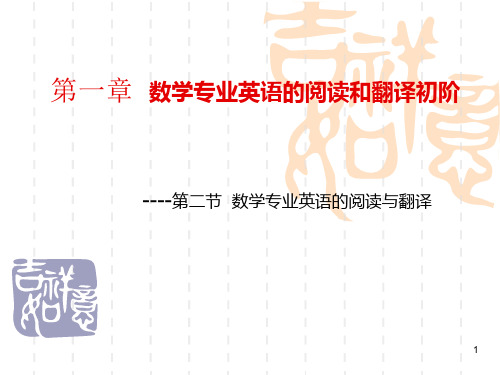
(1)找出句子的主要成分和较明显的语法特征. (2) 做大意群的划分. (3) 然后做小意群的划分. (4) 最后进行综合校对. 对数的使用把计算的劳动强度减少到这样的程度, 即许多计算当未采用对数时需要耗费几个小时,而 现在由于借助于对数只需要用原来的很少一部分时 间就能完成.
12
7. 翻译的若干技巧
16
(4)词序的变动
英语中,倒序的句子,翻译时,需要按自然词序译 出.英语中一般短语和定语从句,单个分词或形容词 做定语都后置,翻译时一般需要译成正常词序. The square root of a negative number is a pure imaginary .
负数的平方根是纯虚数.
17
2
(4)归纳段落大意和全文主题. 2. 提高阅读理解的方法 (1)掌握基本语法,习惯用法和常用单词的基本用 法,逐步扩大常用数学单词和词组的识记和使用范围; (2)多读多练,在阅读专业英语的过程中,逐步掌握 数学专业英语的特点,不断总结提高.
3. 正确的阅读方法
3
(1)speed:60/min ; (2)理解具体信息(main idea,best title) ; (3)理解文中概念性涵义(concept) ; (4)相关推理判断和引申(infer) (5)根据上下文推测生词的涵义; (6)理解文章总体结构; (7)理解作者的意图,观点和态度; (8)区分论点和论据(例证题).
18
(6)句子成分的转换
状语译成主语,定语译成谓语.
The statement of the Gauss theorem is as follows:.
高斯定理叙述如下:
主语statement 译成了谓语.
19
(7)语态和人称的改变
(抱佛脚必备)数学专业英语重点词汇

【Mathematical analysis】1 、上确界(supremum value) 下确界(infimum value)2 、极限(limit) 导数(derivative) 一阶导数(firstderivative) 二阶导数(second derivate)偏导数(partialderivative)方向导数(directional derivative)3 、泰勒展式(Taylor’s expansion) 洛必达法则(L’Hopital’srule) 链式法则(chain rule)连续可微(continuouslydifferentiable)4、微积分 (calculus)微分(differential)级数(series)积分(integral)原函数 (antiderivative)不定积分(indefinite integral)定积分(definite integral)5 、调和级数(harmonic series)马克劳林级数(Maclaurin series)交错级数 (alternating series)傅里叶级数(Fourier series)6 、二重积分(double integral)三重积分(triple integral)多重积分(multiple integral) 格林公式(Green’s formula)斯托克斯定理(Stokes’ theorem)7、收敛(convergence)发散(divergence)一致收敛(uniformly convergent)绝对收敛(absolutely convergent)条件收敛(conditionally convergent) 连续(continuity) 一致连续(uniformly continuous)8 、指数函数(exponential function)对数函数(logarithmicfunction)幂函数(power function)初等函数(elementary function)三角函数(trigonometric function) 调和函数(harmonic function) 周期函数(periodic function) 可微函数(differential function)单调函数(monotonefunction)9 、素数(prime number) 正数(positive number) 负数(negative number) 相反数(opposite number) 自然数(natural number) 有理数(rational number)无理数(irrational number)实数(real number)虚数(imaginarynumber)复数(complex number) 10、等式(equality)不等式(inequality)三角不等式(triangle inequality)勾股定理(Pythagorean theorem)无穷大(infinity)无穷小(infinitesimal)【Linear algebra】1、向量(vector)秩(rank)行列式(determinant)线性方程(linear equation)2 、奇异矩阵(singular matrix)可逆矩阵(invertible matrix)逆矩阵(inverse matrix) 转置矩阵(transposed matrix)酉矩阵(unitary matrix)对称矩阵(symmetric matrix)正定矩阵(positive definite matrix)负定矩阵(negative definitematrix) 雅克比矩阵(Jacobian matrix)3 、迹(trace)主子式(principle minor)代数余子式(algebraic cofactor)4 、二次型(quadratic form)标准型(normal form)最小多项式(minimal polynomial) 特征多项式(characteristicpolynomial)约当块(Jordan block)5 、特征值(eigenvalue)特征向量(eigenvector)约当标准型(Jordan canonical form)6 、几何重数(geometric multiplicity)可对角矩阵(diagonalizable matrix) 【Analytic Geometry】1 、平面几何(plane geometry) 立体几何(solid geometry)射影几何(projective geometry)代数几何(algebraicgeometry)黎曼几何(Riemann geometry)微分几何(differential geometry)几何分析(geometryanalysis)分形几何(fractal geometry)2 、平行线(parallel line) 中线(median line) 直线(straightline) 垂直线(vertical line)水平线(horizontal line)切线(tangent line)法线(normal line)3 、抛物线(parabola)椭圆(ellipse)双曲线(hyperbola)斜率(slope) 【Complex analysis】1 、解析函数(holomorphic function) 留数定理(residualtheorem) 柯西积分公式 (Cauchy’s integral formula)2 、定义域(domain) 值域(range) 像(image) 中值定理(mean value theorem)3 、凸函数(convex function) 凸集(convex set) 变分不等式(variational inequality) 变分法(calculus of variation)线性规划(linear programming)【Real analysis】1 、测度(measure) 可测函数(measure function) 可积函数(integrable function) 平方可积函数(square integrablefunction)黎曼积分(Riemann integral) 勒贝格积分(Lebesgue integral)【Functional analysis】1 、内积(inner product) 向量积(cross product)范数(norm)2 、向量空间(vector space)距离空间(distance space)拓扑空间(topological space) 测度空间(measure space)线性空间(linear space)内积空间(inner product space) 希尔伯特空间(Hilbert space) 赋范空间(normed space) 巴拿赫空间(Banach space)完备空间(complete space)可分空间(separable space) 概率空间(probability space)3 、有穷维的(finite dimensional)无穷维的(infinitedimensional)基底(basis) 线性相关(linear dependence) 线性无关(linear independence) 最佳逼近(bestapproximation ) 最大值原理( maximum principle) 比较原理( comparison principle)最小二乘(least squares)4、泛函(functional)线性算子(linear operator)有界线性算子(bounded linear operator) 有界线性泛函(boundedlinear functional) 闭图像定理(closed graph theorem)一致有界定理(uniform boundedness principle)不动点定理(fixed point theorem)压缩映照定理(contraction mapping theorem)【Supplements】1 、引理(lemma)推论(corollary)公理(axiom)命题(proposition)猜想(conjecture) 数学归纳法(mathematical induction) 充分性(sufficiency) 必要性(necessity) 反例(counterexample)2、加法(addition)减法(subtraction)乘法(multiplication)除法(division)3、理想(ideal)环(ring)单位(unit)陪集(coset)群(group)域(field)置换群(permutation group)有限群(finite group)同态(homomorphism) 同构(isomorphism)维数(dimension)4 、抽象代数(abstract algebra) 广义函数论(theory of distribution) 弦理论(stringtheory) 随机变量(random variable) 动力系统(dynamical system) 偏微分方程(partial differentialequation)。
数学专业英语(只是部分,不是很完整)
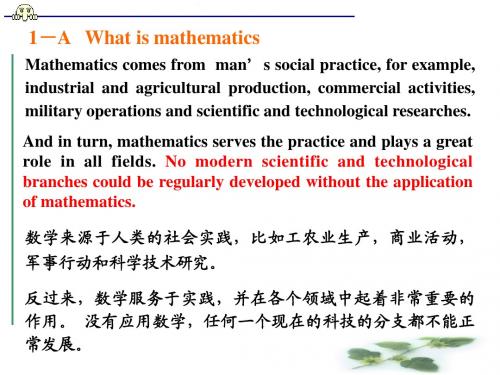
Mathematicians study conceptions and propositions, Axioms, postulates, definitions and theorems are all propositions. Notations are a special and powerful tool of mathematics and are used to express conceptions and propositions very often. Formulas ,figures and charts are full of different symbols. Some of the best known symbols of mathematics are the Arabic numerals 1,2,3,4,5,6,7,8,9,0 and the signs of addition “+”, subtraction “-” , multiplication “×”, division “÷” and equality “=”. 数学家研究的是概念和命题,公理,公设,定义和定理都 是命题。符号是数学中一个特殊而有用的工具,常用于表 达概念和命题。 公式,图形和图表都是不同的符号……..
1-B Equation
An equation is a statement of the equality between two equal numbers or number symbols. Equations are of two kinds---- identities and equations of condition. An arithmetic or an algebraic identity is an equation. In such an equation either the two members are alike, or become alike on the performance of the indicated operation. 等式是关于两个数或者数的符号相等的一种描述。 等式有两种-恒等式和条件等式。算术或者代数恒等式都是 等式。这种等式的两端要么一样,要么经过执行指定的运算 后变成一样。
数学专业英语

第一章 数学专业英语的阅读和翻译初级阶段1.1 数学专业英语的基本特点一 注意对客观事实与真理的描述:1. 语句事态的使用上常用一般现在时例 An equation is a statement of the equality between two equal numbers or number symbols.2. 被动语态出现频率高“It is …”句型也使用得多例 It is cleat that any function defined for all positive real x may be used to construct a sequence by restricting x to take only integer values.3. 主动语态句型也多数用于强调事实,而不是强调行为发出者及其情感 例 1:Given ε> 0,there exits a number N>0. such that ε<-a a n for all n ≥N 例 2:Since h(x) is harmonic on a neighborhood of B(a,r), we have)()()(a h x d x h B =⎰∂σ“we have ” =one has 可省略 译为 “可以得出”什么结论二 科学内容的完整性与表达形式的精炼性要求三 数学的专业性十分典型1、有的概念可能有几个同义词 如“计算”有:count calculate calculationcalculus compute computation2、同一词根的次和词组很多,如:Integrability 可积性 integrable 可积的 integral 积分,积分的,整数的 integral calculus 积分学 integralization 整化 integrate 积分3、半专业词汇多是出现频率高 如:function 函数functional 泛函power 幂set 假定,令4、数学词汇具有自己的特点(不易记忆)5、表示条件,推理根据的句型相对固定如(1)用if,when, as为连接的条件从句例:The function f(x) approaches infinity as x tends to zero.(2)用with 短语表示条件或补充条件例:Suppose D is an open set with its closure in G.(3)用such that 为连接词的从句表示条件或补充条件例:Suppose f(x) is a function on a domain D such that ︳f(x) ︳< M for all x ∈D,when M is a constant.Such that =satisfying(4)虚拟语气表示条件.(5)用特殊动词,如:suppose, let, set, assume等表示假设.(6)表示推理的根据常用“by”短语,也用“according to”例:By lemma 2we have x≥y6、形成了一批数学特殊记号和表达式(1)充分必要条件The sufficient and necessary condition when and only when =if and only =iff(2)表示事先任意取定的量例:对任意的ε﹥0 即 For any number ε﹥0,或Given ε﹥01.2 数学专业英语的阅读和翻译一、翻译技巧1、词义的选择及引申例 1.A take its value 3 take value “取值”2.Two and three make fiveMake “制造”引申为“等于”3.Year after year and century after century the moon goes through itscycles of changes.月亮的盈亏变化,一年又一年,一世纪又一世纪,周而复始。
数学专业英语
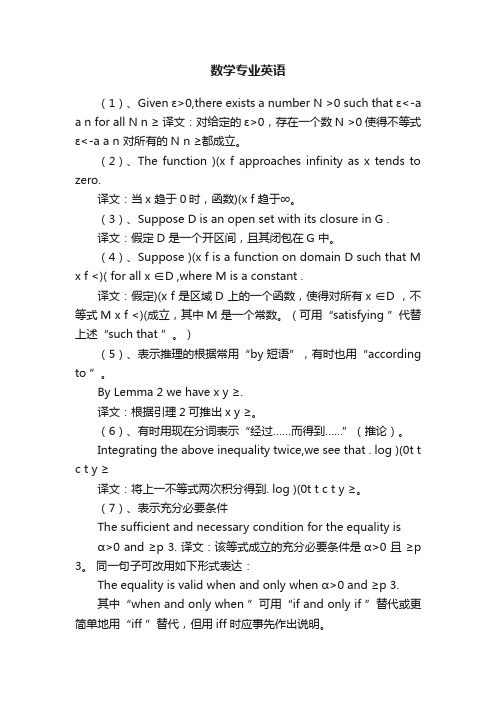
数学专业英语(1)、Given ε>0,there exists a number N >0 such that ε<-a a n for all N n ≥ 译文:对给定的ε>0,存在一个数N >0使得不等式ε<-a a n 对所有的N n ≥都成立。
(2)、The function )(x f approaches infinity as x tends to zero.译文:当x 趋于0时,函数)(x f 趋于∞。
(3)、Suppose D is an open set with its closure in G .译文:假定D 是一个开区间,且其闭包在G 中。
(4)、Suppose )(x f is a function on domain D such that M x f <)( for all x ∈D ,where M is a constant .译文:假定)(x f 是区域D 上的一个函数,使得对所有x ∈D ,不等式M x f <)(成立,其中M 是一个常数。
(可用“satisfying ”代替上述“such that ”。
)(5)、表示推理的根据常用“by 短语”,有时也用“according to ”。
By Lemma 2 we have x y ≥.译文:根据引理2可推出x y ≥。
(6)、有时用现在分词表示“经过……而得到……”(推论)。
Integrating the above inequality twice,we see that . log )(0t t c t y ≥译文:将上一不等式两次积分得到. log )(0t t c t y ≥。
(7)、表示充分必要条件The sufficient and necessary condition for the equality isα>0 and ≥p 3. 译文:该等式成立的充分必要条件是α>0 且≥p 3。
- 1、下载文档前请自行甄别文档内容的完整性,平台不提供额外的编辑、内容补充、找答案等附加服务。
- 2、"仅部分预览"的文档,不可在线预览部分如存在完整性等问题,可反馈申请退款(可完整预览的文档不适用该条件!)。
- 3、如文档侵犯您的权益,请联系客服反馈,我们会尽快为您处理(人工客服工作时间:9:00-18:30)。
2
Mathematical English 1: Mathematics, Equation and Ratio
trigonometry and algebra, in which only the constants were considered. The rapid development of industry in 17th century promoted the progress of economics and technology and required dealing with variable with variable quantities. The leap from constants to variable quantities brought about two new branches of mathematics -- analytic geometry and calculus, which belong to the higher mathematics. Now there are many branches in higher mathematics, among which are mathematical analysis, higher algebra, differential equations, function theory and so on. Mathematicians study concepts and propositions. Axioms, postulates, definitions and theorems are all propositions. Notations are a special and powerful tool of mathematics and are used to express conceptions and propositions very often. Formulas figures and charts are full of different symbols. Some of the best know symbols of mathematics are the Arabic numerals 1, 2, 3, 4, 5, 6, 7, 8, 9, 0, and signs of addition “+”,
Dr. Xiaomin Zhang: Mathematics Department, School of Science, Ningbo Universitylish 1: Mathematics, Equation and Ratio
Notations
mathematical analysis The area of mathematics generally taken to include those topics that involve the use of limiting process. Thus differential calculus and integral calculus certainly come under this heading. Besides these, there are other topics, such as the summation of infinite series, which involve infinite processes of this sort. The term analysis has also come to be used to indicate a rather more rigorous approach to the topics of calculus, and to the foundations of the real number system. logical deductions The logico-deductive method, a system of inference where conclusions (new knowledge) follow from premises (old knowledge) through the application of sound arguments.
induction The process of deriving general principles from particular facts or instances.
axioms, postulates The basic assumptions underlying a given body of deductive knowledge. They are accepted without demonstration. All
Dr. Xiaomin Zhang: Mathematics Department, School of Science, Ningbo University
5
Mathematical English 1: Mathematics, Equation and Ratio
other assertions (theorems, if we are talking about mathematics) must be proven with the aid of the basic assumptions. Axiom , in classical terminology, referred to a self-evident assumption common to many branches of science. At the foundation of the various sciences lay certain basic hypotheses that had to be accepted without proof. Such a hypothesis was termed a postulate . The postulates of each science were different. Their validity had to be established by means of real-world experience. The classical approach is well illustrated by Euclid's elements, where we see a list of axioms and postulates. A1 Things which are equal to the same thing are also equal to one another.
Mathematical English 1: Mathematics, Equation and Ratio
Mathematical English
Dr. Xiaomin Zhang Email: zhangxiaomin@
Dr. Xiaomin Zhang: Mathematics Department, School of Science, Ningbo University
A2 If equals be added to equals, the wholes are equal. A3 If equals be subtracted from equals, the remainders are equal. A4 Things which coincide with one another are equal to one another. A5 The whole is greater than the part. Dr. Xiaomin Zhang: Mathematics Department, School of Science, Ningbo University
Dr. Xiaomin Zhang: Mathematics Department, School of Science, Ningbo University
3
Mathematical English 1: Mathematics, Equation and Ratio
subtraction “−”, multiplication “×”, division “÷” and equality “=”. The conclusions in mathematics are obtained mainly by logical deductions and computations. For a long period of the history of mathematics, the centric place of mathematics was occupied by the logical deductions. Now, since electronic computers are developed promptly and used widely, the role of computation becomes more and more important. In our times, computation is not only used to deal with a lot of information and data, but also to carry out some work that merely could be done earlier by logical deductions, for example, the proof of most of geometrical theorems.
1
Mathematical English 1: Mathematics, Equation and Ratio
